#its flaws are mostly genre related etc
Text
I think one of the main problems with MHA is that it's not anti-establishment enough. Like, in this era of media and pop culture, we (as viewers) are used to seeing stories of underdogs, of resistance groups fighting against authority. The most famous example of this would be Star Wars, which was commentary on the Vietnam War/Cold War. And then you have examples like the Hunger Games and the YA dystopia boom of the 2010s - all focused on resistance against government systems. (This of course, speaks towards the current sentiments on modern-day governments) I mean, hey, you've probably seen those cringy posts about "how does the government expect us to be complacent when we were raised by characters who resisted fascism." You know the ones.
While this genre of YA media is most prominent in western culture, MHA *has* become a part of mainstream western culture, due to its success. So many of the ppl active in the fandom, making fanworks, etc, are exposed to this trope as (mostly) the norm. And, in comparison to this trope, MHA just doesn't...sit right.
From the start, the world of MHA is flawed. I think everyone can agree with this. Quirkiness kids are bullied, one of the top heroes beats his children, there's an organization creating child soldiers, etc, etc. Hell, in the first episode, there's even a mention that literally every single kid wants to be a hero when they grow up! That can't be good for the economy, can it?
But instead of working to fix this, hori just gives us a worse evil to brand as the enemy. Asking the viewer to choose the best of two evils, hoping we will ignore problems like discrimination to overthrow the people who are literally making human puppets. Hori wants the world of MHA to appear "black and white" but really, it kinda just appears..."black and ehhhh...grey." Which, I mean, is quite realistic given our *current* world but...I guess it doesn't fit the genre? It's not satisfying, really. Or particularly well executed.
On top of this, the problems present in the hero world are ones that Hori's viewers might very easily relate to. Bullying, domestic violence, discrimination, even sexism (though that one is one that is VERY MUCH not deliberate on hori's part...ugh). Which is why, even though, realistically, Bakugou telling Izuku to k*** himself isn't worse than AFO making LITERAL MONSTERS OUT OF CORPSES, it feels that way. Because, y'know, I don't think any of the MHA viewers out there are at risk of being nomu-ified.
So, what happens? No matter how evil Hori tries to make Shiggy, people will still like him. Because he's not violent in a way that is relatable, he's just...edgy. And also hot as hell.
tl;dr? Hori created a morally grey world and refused to fix any of its problems, so we all simp for the murderous hand-man.
#this is actually a mess i'm proud of u if u read it all#shigaraki tomura#bnha#bnha meta#bnha analysis#analysis#hori is a bad writer#bnha critical
134 notes
·
View notes
Note
i'm currently rereading thtf rn, and in one of the author's notes at the end of the chapter you said that you think voldemort wasn't a good villain. i agree with you on that 100%, and i'd really like to hear all your thoughts on why you think that way.
fun question!!! i am happy 2 discuss w the caveat of course that this is all my subjective opinion etc etc
i feel like the reasons i don't think voldemort is a "good" villain (in terms of storytelling) can sort of be broken into 2 main things
1: voldemort as a character
so by this i mean, without looking at the broader story or wizarding society + how voldemort's character functions like...narratively within the story, just looking at the character itself. characterwise i think voldemort is just....pretty flat.
like, from the way dumbledore describes voldemort as a child, we're basically supposed to view him as a character who has always been fundamentally evil, like he was "born bad." sure, there's some gesturing towards society with the tragic backstory w his parents, growing up in an orphanage, hating his dad, etc. but none of that is fully fleshed out in a way that indicates voldemort might have been good if his circumstances had been different; instead, it's mostly just used to explain why he hates muggles so much. but he's portrayed as sadistic and manipulative from the time he's a child, a kid who has always wanted power and just continues to seek power his entire life. this is just....a boring character, in my opinion. tautological evil doesn't really give us anything to think about, anything to question, anything to pull from the story and relate to real life--because in real life, people aren't just born evil, y'know?
and obviously people can say "oh well it's a kids' story of course it's gonna be simple and black + white when it comes to good + evil!" but honestly i just don't buy that argument. i've encountered plenty of kids' media that is not so boring and black + white with its portrayals of good vs evil (animorphs comes immediately to mind). so! to me it still just feels like a flat + boring character.
2: voldemort as a figural evil
a lot of what i have to say here can be summed up in this quote from harry potter and the leaky genre:
"And herein lies the true fantasy in Harry Potter: that systemic dysfunction can be destroyed because it has been artificially projected onto, and reduced to, one locus: the person of Voldemort."
rao talks about this in his essay very succintly, but basically--in the harry potter universe + the overarching narrative of the story, voldemort functions as a figural symbol onto which all of the systemic issues of wizarding society can be projected + neatly defeated in one fell swoop. throughout the series, we see an abundance of systemic flaws + oppression in the wizarding world, all of which are deeply ingrained and none of which can be boiled down to one single person's individual intent. and yet, voldemort becomes the symbol for Everything That's Wrong, and we are led to believe that if harry potter can just triumph over Evil, then everything will be fixed.
essentially, voldemort becomes a political sleight of hand. our eyes are drawn away from the systemic issues that need to be uprooted and overhauled, and we're so busy watching harry potter embark on his quest to defeat The Bad Guy that by the time the dust settles we're supposed to be satisfied with our nice little happy ending, rather than questioning why harry potter would become a wizard cop working for the ministry of magic when that institution was shown to be fundamentally flawed throughout the course of the series.
this representation of evil is very much rooted in jkr's conservative politics + worldview, and it's something that you'll find throughout a lot of political rhetoric--the idea that there is a specific outside figure or group who is the Source of Evil and a Threat to Good (read: our pre-existing institutions + society), and so we need to focus all our energy on destroying The Bad Guy rather than taking a look at our own flawed institutions and overturning existing oppressive structures. all in all, it's a type of evil/villainy that i do not find compelling in storytelling and that i think is actively bad because of the political narrative it perpetuates. and so that's what i'm getting at when i say that i don't think voldemort is a "good" villain!
#ask#ranting and raving#thtf#honestly there's probably more that could be said/expanded on in terms of like#how voldemort as a character is just not super well-written#and also in terms of the politics#but i did not want to ramble on too long lol#highly recommend that article i linked if u r looking 2 read more!
29 notes
·
View notes
Text
dear fluff exchange author
thank you so much for writing for me! i hope you will have fun with this match. i'm very easy to please as a reader and love being surprised. in addition to my requested tags, please feel free to write to any of my likes below, or to similar tropes as long as you avoid my DNWs.
please click the read more for all my thoughts and feelings!
--
🥰 general fluff notes: i enjoy the whole spectrum of human connection: deep friendship, ensemble-as-family, and romance across the full pre-ship to established relationship spectrum. i have a special love for the early stages of a new relationship, where characters are just figuring out how the other person likes to be loved. complications and challenges, especially those that tie into the characters' canon lives and character flaws are delightful. i find fluff most rewarding when it's still tied into the canon setting/genre, but within that, i love what-if canon divergence (especially when it sidesteps character death or keeps the ensemble together). angst, hurt/comfort, etc as fluff fuel is welcome!
--
💕 i love: canon divergence | complications (e.g. working together while in a relationship, emotional baggage, canon happenings, etc) | episode-related fics | fix-its | friends to lovers | happy/hopeful endings | healing through connection | hurt/comfort | “it’s just casual” to lovers | keeping the family together | meaningful friendships | new just-figuring-it-out relationships | other canon characters included in the fic | pining | 5-times | all ratings are welcome | treats are welcome too!
🔥 kinks enjoyed: aliens made them do it (or local canon dubcon equivalent) | blow jobs | body worship (especially related to body changes like aging, scars, weight gain, etc) | edging | hand jobs | masturbation | non-penetrative sex (not that i’m opposed to penetrative sex, just another thing i enjoy!) | overindulgence (food, drinks, sex, etc) | soft dom/sub (bondage and praise yes, pain and shame no) | telepathy | watching/voyeurism | sweet i-love-you sex works for me too!!
⛔️ DNWs: alternate-setting AUs (law office, coffee-shop, etc; large and small canon divergences are welcome though!) | bashing of other characters or past canon relationships | cannibalism | crossovers (except between series in the same universe, like star trek) | hurt no comfort | non-canon nicknames | non-con between requested characters (dubcon ok) | non-sexual bodily fluids in sex scenes | permanent character death | spelling out accents (for human characters) | unplanned pregnancy | zombies or blood-sucking vampires (other canon-typical aliens and cryptids are welcome!).
--
⛑ M*A*S*H ⛑
this is my latest fandom and i'm obsessed! margaret is my favorite disaster at the moment, but i love them all soooo much and want to study them in a terrarium.
by the time of reveals, i will likely have seen up through season 6, so i prefer stories using that canon knowledge (it's a preference, not a dnw, so please don't stress if you can't remember when something happened!).
special pairing notes: for hawkeye & margaret, but pre-ship/heading toward romantic is totally allowed as long as it's mostly focused on the friendship stage. to my questionable shame, i really enjoy the kiss slap kiss frank/margaret ship -- it's not a pairing i requested, but it's fine to include their canon relationship in any fic.

extra prompts and thoughts:
it has been the longest day, week, or year of their lives...
[relationship] are trapped away from camp for 24 hours and have an unexpectedly great and/or terrible time
[relationship] are away from camp for 24 hours on purpose (a pass, meeting with the brass somewhere, etc) and have a great and/or terrible time
i have such a soft spot for the developing surrogate father/daughter relationship between colonel potter and margaret, and would weep happy tears for anything that brings them closer together
i nominated the "one canon change makes everything fluffier" tag specifically because i had just seen the episode "kim." if that adoption had ultimately gone through, how would it change the relationships in camp if they had this kind of shared child back in the states? (and maybe, how would it change their return home after the war?)
--
👽 Stargate SG-1 👽
clone sam/jack are my highly specific pairing darlings! i love the mixed blessing and curse of having the chance to live their lives over. the "growing old together" tag can be interpreted as "growing up together" (or if you wanted to do a flash-forward to the traditional meaning, go for it!).
dnw notes: please don't have sam & jack change their first names. i usually dnw unexpected pregnancy, but it's ok for this pairing.

prompts:
one of them gets injured or is somehow in danger -- they used to deal with far worse every week, so why does this feel different?
a field trip (school-sanctioned or one of their own)
when/how does this life start to feel like their own?
--
🌃 Stargate Atlantis 🌃
sheppard/weir is my bulletproof otp. it's hard to go wrong! i love the early stages of their professional relationship and friendship when they're figuring each other out, and how john immediately becomes ride-or-die as soon as she defends him on earth. i'm fine with any way you choose to deal or not deal with the replicator arc as long as she survives and comes home and at her core she's still elizabeth.

prompts:
john and the challenge of giving/receiving affection (and Having A Feeling in general) is always fun to play with...
getting stuck off-world for 24 hours and having an unexpectedly great and/or terrible time
sexual healing by mapping each other's scars
--
🛸 The X-Files 🛸
this show was one of my first loves, and season nine inspired me to join online fandom for the first time! i love the season nine relationships between the agents, with all the growing friendship, trust, and potential romance. when it comes to fluff, i started thinking about all the tragic children and how things might have gone if one or more of them had stayed alive/stayed around... especially if the rest of the harsh backdrop of the x-files universe doesn't change.
i love (appropriate familial and friendship) adult & child relationships, especially when it leads to some healing for the adult! that said, i have a strong preference for canon children rather than OCs.

prompts:
season nine agents get snowed in overnight with ghosts (dealer's choice if they're paranormal ghosts or the metaphorical ghosts they're all carrying around...) and it brings them closer together
emily lives!! (either healthy or still ill) how does that unexpected new challenge/blessing impact both scully and mulder?
monica's dedication to loving people on purpose is one of the reasons i love her so much... how do doggett and/or scully return the favor?
--
🍄 Star Trek: Discovery 🍄
discoveryyyyyyy. the final frontier of feelings. i love them so much!!! if you choose to write about pike or spock, classic trek and strange new worlds canon are fair game. relationship info going into the bullet points below:

pike/vina... a childhood ship came back in a huge way in the discovery episode "if memory serves." i would LOVE really anything about them, but i think all the time about how perhaps she might show up in his dreams via illusion powers, or what if she left with him after "the cage" or especially after "if memory serves" now that he has grown and changed himself...
pike & the crew of discovery: una, who knows him quite well, called him entirely unsentimental... but in the last episode of season 2, in pike's goodbye to the crew, he calls them "family" (and i cried about it). how did that happen?
michael and spock!!!! oh god i have so much love for them, and how spock must continue to think about her. that tag about "leaving notes in books" when they're children, and perhaps later in his autobiography or another message he hopes will reach the future...
michael feeling loved and accepted by her adopted family as a child and her crew as an adult in any form that might take <3
--
whew!! i hope something here was inspiring! i look forward to reading and loving whatever you write.
3 notes
·
View notes
Text
I decided ahead of time not to watch season 4 of the Boys.
I was recently vindicated in this decision:

So a main character's sexual assault at the hands of a villain, where he is clearly feeling a lot of intense emotions, going on for a brutal length of time onscreen, is meant to be comedic.
Keeping this in mind, I think the show has earned enough bad faith that I can happily talk shit about some of it.
Like, not all of it. There were reasons I watched all the way through season 3! Lots of good character work, great action, some effective deconstruction of celebrity culture and the corporate/political machine behind it.
But there are a lot of cracks that really started to show and led to me jumping ship.
The women in the show keep on getting defined relative to the male characters. At first it seems like it's women portrayed trying to exist relative to a toxic masculine environment but it really seems more than that: Becca, once she's saved and allowed to be a character for a bit beyond a man's tragic backstory, is shortly fridged. A-Train kills his girlfriend and that is just fuel for his character development. Starlight, Kimiko, and Stormfront are mostly defined by their relationships with their male partners. The Deep is given way, way too much focus, turning him into a recurring comedic relief sort of character, which, even if the joke is he's so pathetic, is still treating a man who raped one of the main characters for laughs and giving his story way too much priority and screentime that just wasn't needed.
This is related to a lot of really crass and fucked up black humor being used way too casually on the whole. It was in service of poking fun at the very clean depictions of violence that the superhero genre and the media machine would prefer, and so I had some good faith towards this. But in light of the above comments, that good faith is highly depleted.
The show's other big flaw is that it keeps undermining its own stance against fascism, which was really conspicuous in season 3. It clearly outlines that attempts to reform the corrupt system will ultimately be subverted and co-opted by the system, and peaceful means of rebellion can simply be ignored by a powerful and indifferent regime with a monopoly on force. However, all violent means of dealing with the oppressive regime are subverted, with the show portraying the violence the Boys engage in as fundamentally corrosive to them, and all meaningful plans to take against Vought having unacceptable collateral damage. Depicting problems with violent rebellion is good, but by the end of season 3, all action we are signaled to be rooting for is in favor of the oppressive status quo: Homelander shouldn't be killed, Vought shouldn't be wrecked, people need to stand down, etc. The fact that the Boys are government agents with little accountability furthers the theme of toxic masculinity saturating the violence, but also takes the teeth out of its ability to criticize its fascist villains. This is a show ostensibly about fighting the evil superheroes that are embodiments of the worst excesses of humanity, starring a government black ops team with their own excesses, that chickens out of fighting the evil superheroes, made by a company that epitomizes excess, and run by a man who thinks sexual assault is funny.
There are good parts to the show, I'm sure there will continue to be good parts to the show, the show has been an important contribution to the conversations surrounding the superhero genre. But I am comfortable in saying that it is simply not worth my time.
1 note
·
View note
Text
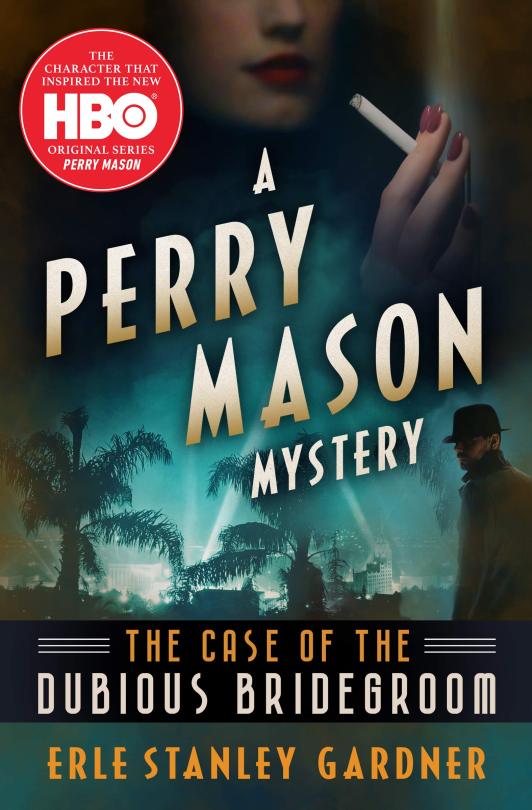
The Case of the Dubious Bridegroom, by Erle Stanley GardnerThis is one of the Perry Mason novels, the 33rd (of 82!) in the series. I'd read a few books in another series by Gardner, but none in this one. Apparently Gardner got his start in the pulps, which would help to explain his insane productivity. This novel has a lot of the elements familiar in pulp detective, gumshoe, film noir, hardboiled, whatever-term-you-like genre: a tough hero, sexy dames, corrupt business folk, etc. Mason and his sidekicks, an able private detective, and Mason's secretary, who seems like she's supposed to be impressive, but all she does here is take notes and make a couple of observations from a "woman's point of view" (mostly clues related to fashion that the guys wouldn't notice). They try to figure out the tangled mess surrounding an accidental bigamist, his not-really-ex wife, and a scam involving proxies in a shady mining corporation. The book does all of that well, although it's very tame compared to what's in the most recent TV adaptation of this series (which can get extreme, to be fair), and was pretty tame back in its day. This series was very popular (adapted into an earlier black-and-white TV series, and movies and radio dramas before that), so it keeps things palatable for a mid-twentieth century mainstream audience. It's also entirely plot-driven. Mason's motivations for taking the case and working so hard on it are taken for granted. He and his allies exist solely for their jobs, no hints of lives beyond that. But maybe that stuff was established in the first 32 books?
One thing that seems a bit out of sync for the time these books came out is how poorly they depict the police and the district attorneys. On the one hand this feels like a pretty conservative take on the hardboiled thing, but it's also got the cops trying to pin the murder on the most convenient target, coaxing witnesses into "remembering" things in a way that supports their case, etc. All the stuff that's considered wildly liberal by many people today. Of course, part of that could simply be because Mason is a defense attorney. And the people he's defending may have poor ethics, but they're also respectable white people. Still, it feels weird that this book that was a big hit in my grandpa's day is mildly woke (regarding that one topic). Things change, I guess.
Gardner used pseudonyms for the more interesting stuff. One those was the Cool and Lam series, which is the one I've read a bit of. It's also not remotely racy by today's standards, but the characters are flawed, and more developed. The hero of those, a private detective named Donald Lam, is a short guy who gets beat up all the time, and his boss, Bertha Cool, is a money-grubbing opportunist. Whereas Mason is practically a Mary Sue. He's a famous lawyer who never loses, he doesn't seem to have any weaknesses, and the only people who don't like him are the cops and DAs who are so darn mad at him for making them look bad when they try to put away the wrong guy. I have one more of these Perry Mason books on my shelf, which I'll read because this one was fun, but unless it's significantly more interesting, I think I'll stick to the Cool and Lam series after that. (Those were written as A.A. Fair, although the more recent reprints attribute them to Gardner on the cover.)
#mystery#books#book cover#perry mason#perry mason book#the case of the dubious bridegroom#erle stanley gardner
0 notes
Text
horrific hot take , the publishing landscape for lgbt stories currently is FULL (mostly) of sanitized YA Wholesome stories... I really am not seeing lgbt books in a lot of other genres, especially adult? I see a lot more kid lit having lgbt themes, though. really i'm starting to think it's homophobia (obviously) but in the way of sanitizing lgbt shit. like, if you publish lgbt stories its like wow representation<3 but if it's only for kids and teens, those stories obviously aren't going to contain themes like ACTUAL SEX and HARDER PILLS TO SWALLOW-ESQUE topics. so instead we are only receiving a no-kink-at-pride type of lgbt literary experience lately.
where are lgbt stories in the adult genre? besides more well-known titles from several years-decades ago? there are some currently being published, but the amount is SO scant (in comparison with YA lgbt stuff and adult non-lgbt stuff). AND.... those stories are just like... not really receiving much popularity? maybe one or two here and there?
i want flawed gay characters i want gay characters for adults i want hard topics about gay characters i want REAL gay characters! i can't relate to softboy hold-hands gay boys and i can't relate to powerful edgy no-tears lesbians... what is there to read instead but lgbt stories from decades past with tragic endings and suffering? it's almost like one can only be gay if you're sexless, palatable, easy-to-swallow, marketable at old navy, etc. and if you're flawed, sexual, struggling, human... well get ready for the inevitable tragic ending :/ should've thought twice before embarking on your unwholesome villain era.
83 notes
·
View notes
Text
hetalia rant
pls ignore how I won't use any proper punctuation or capitalization because my arms and fingers all hurt from volleyball :( Edit: My arm’s are better now so I’m actually using proper capitalization and punctuation (special thanks to my friends for proofreading and also Google autocorrect.) Special thanks to my friend for helping me out with writing this.
so i'm one of those people who joined the hetalia fandom like REALLY late, having first watched the anime in like 2017 or 18. Nevertheless, when I heard about how the anime was coming back in 2021 I was really excited!! I’ve been reading world stars lately but there’s just something in the hetalia anime that made me love it so much. the voice acting and how it’s animated and everything, it really brings the characters to life! out of curiosity I searched up hetalia on twitter. keep in mind that i’m pretty new to the fandom so i never really got to see the shipping wars, or really any toxic part of the fandom, since i wasn’t there when hetalia was at its peak.
What i saw was really different from what i expected to see. I kinda expected twitter threads hyping up the new season, or things like that but most of ones I found in the top section were hate comments about hetalia, and things about why it shouldn’t come back. I was reading these and I was like, wait why? Some of them actually made sense, and the others had flawed logic. Here are my rants on why hetalia ISN’T anti-Semitic or problematic (as of now).
Misconceptions About Hetalia
1. Hetalia is About Nazi Germany or the Holocaust
If you’ve actually watched the show/read the manga, it’s quite obvious that although some of the events take place during WW2, it never mentions Hitler, Nazis, the Holocaust, or anything like that. and there’s a good reason for it. In the first place, hetalia isn’t meant to be a serious comic. The manga only focuses on subjects like funny things that happened to historical figures/occurrences during a war, weird inventions; generally those kinds of things. It focuses on the cultural differences between countries, or wholesome moments in history (such as when two enemies stopped fighting on Christmas day to play soccer.) Hetalia itself is antiwar. Consider the main character himself: he absolutely hates fighting. I don’t see how hetalia can be anti-Semitic or pro-war at all. But what I will say is fucked up are those certain cosplayers that did the Nazi salute, posed in front of a Holocaust memorial, etc. But I can still guarantee that the MAJORITY of the fandom is not like this. Every single fandom has its bad apples, some more than others. It’s not right to generalize the entire fandom as anti-Semitic, racist, disrespectful shits.
Do people realize that Germany’s character in Hetalia isn’t Nazi Germany? In the first place the Holocaust wouldn’t be Germany’s responsibility — the depictions of these characters are meant to portray the people as a whole, not their systems of law or government. It’s stated in the series that nations MUST obey orders from their “boss” (which probably refers to the country’s ruler, president, prime minister, or other leaders at the time. Nations can’t choose what their superiors do, or what those under that control do. Saying Germany is humanized Nazi Germany is like putting that label on all German people without considering factors like time period or representation. Hetalia characters are a mere representation of each country’s people, nothing else.
How does mentioning WW2 in a comedy make it offensive? There are PLENTY of movies, novels, and other kinds of media that take place in WW2 and yet are in the comedy genre. Ever watched Jojo Rabbit? If you thought Hetalia was offensive, have you ever watched South Park or looked at CountryHumans? I do get why some people dislike Hetalia, but why does it receive so much hate for something that was never in the series (or generally speaking, for the wrong reasons)? It may have flaws, but there’s a strong definition to what those flaws actually are. It doesn’t revolve around antisemitism or Nazism.
2. Hetalia is Racist and Stereotypes People
Now this is a pretty controversial topic. Being a comedy about personified countries, stereotypes are really something that HAS to be used at some point to make the characters funny. But does that automatically make it racist? No. I saw this on a YouTube video comment section somewhere, but stereotyping (generalizing) that all stereotypes are ‘bad’ (or have negative connotations/associations) is literally stereotyping. Not all of the stereotypes are bad. Like the way Britain acts like a gentleman or likes drinking tea, which in a way, is a British stereotype. That’s not a bad thing, just funny to see in the show — played for comedy purposes, and not necessarily offensive.
Although Hetalia characters are sometimes influenced by stereotypes that revolve around the actual countries and represent the people in general, they DO NOT always represent what those country’s people are actually like. Also, I’m pretty sure the point of comedy about personified countries is to use some of those generalizations. Specifically, stereotypes that the Japanese have about foreigners. France is portrayed as a flirty man because in Japan France is known for being a “romantic country.” But that doesn’t mean that they think all French people are like that — it’s just a lighthearted joke. And now, Hetalia characters have grown to be more of their own character rather than simply a humanized country at its base. Despite being a personification, they’re like their own person, not just used to depict stereotypes. Just because a character has a certain personality trait doesn’t mean Hima believes that everyone from that country has the same trait. It’s not meant to be racist, and isn’t.
What I Think Was/Is Problematic
As much as I love this show, there were DEFINITELY some problematic things that people tend to ignore.
1. Korea Controversy
As a Korean American, I have to say that I was quite disappointed when I learned about how Hima portrayed Korea in the manga. I won’t go that deep into this one since it’s not that relevant to what I'm talking about now, but it was definitely a HUGE problem and I’m glad that he was removed from the series.
2. Iron Cross on Germany
The iron cross that Germany wears in Hetalia (in every time period) is a military decoration that was used since the King of Prussia until the time period of Nazi Germany in WW2. Today, it’s considered a hate symbol, similar to and alongside the swastika. To be fair, it wasn’t just a decoration used purely for the Nazis, unlike several other examples of Nazi symbols and memorabilia, so I suppose it could be up to each person to judge whether it should pass or not, despite the surrounding circumstances — it isn’t up to me as part of the fanbase. But personally, I think it should have been removed/not used in the first place. I mean, it wasn’t that necessary, seeing all of the military uniforms drawn in Hetalia were simplified anyways. Perhaps it would be much less problematic if Hima didn’t draw the iron cross, and the same goes for the other presented issues.
3. Japanese Imperialism
The way Hima portrays Japanese Imperialism was pretty offensive in my opinion. An instance is the presentation of the Japanese invasion of Korea. It wasn’t just like how the colonies were under Great Britain’s rule. It limited much more of Koreans’ rights and was much more gruesome. I don’t know about anyone else and can’t speak for each individual, but as a Korean, portraying all of this as Japan merely patting Korea on the head is fucked up. This ties to the controversy of Korea’s character. From what I’ve seen, Hetalia is pretty close to a rightist (in Japan, not the US) series. I won’t dive too deep into that, but rightist — or in Korean, 우익 — animes are animes that glorify their country’s past/country, or use content to make fun of or criticize other nations. Actually, it’s probably much more complicated than that, but as of now I don’t know much about it. It mostly ties to the tension between Koreans and the Japanese, so if you’re not either, there’s not really much to worry about. But (maybe because I’m Korean) I found it weird that the manga seems to give every single character a bad/negative characteristic except Japan. I guess it’s only natural, since the creator is Japanese. But then again, France was basically drawn as a rapist/pedophile, but I have never seen a French person complain about it. Or maybe they just completely avoid Hetalia? If anyone knows about it, I would be glad to listen. Perhaps it’s just a bias that I have as a Korean. It could also be a cultural difference too, since we tend to be very patriotic.
4. The Title: Axis Powers
Although the main character is Italy, and the story revolved (emphasis on the past tense) around the 3 countries that were part of the Axis, Hima should have been more considerate with the title of the show, thinking about what the Axis Powers actually did during WW2. Just “Hetalia” would have been fine. But it also should be considered that when Hima started drawing the manga, he did not expect it to become a long-term thing or for it to blow up so much. Thankfully, only the first two seasons of the anime were titled as Hetalia: Axis Powers, and later seasons were titled more acceptable things, like World Stars (manga) or The Beautiful World.
5. Seychelles
Personally I don’t find a problem with there not being that many African/South American countries in the show. Africa’s country borders (and all of that related material) were very different from what they are today, and it would be really fucking hard for Hima to keep track of all of those while still writing good characters. And unlike Europe, Africa’s history was not transcribed much, and is a lot less-known. The problem with Seychelles was her skin color, which wasn’t accurate. But that’s since been fixed.
Is Hetalia Really Problematic?
My most straightforward answer for this question would be no, it is not problematic as of now. Something I realized while listing all of the aspects of Hetalia that I personally thought were wrong to put in was that most of them don’t exist anymore. Besides Germany’s iron cross, all of them were removed from the show. Korea was banned from the anime, and he no longer appears in any of the manga strips. The manga strays further and further away from topics like Japanese Imperialism or WW2. Most of the time in the manga, countries do not wear their military uniforms anymore, but stick to more casual clothes. The characters stray further away from stereotypes that Hima used to use as a comedic effect when he first started drawing. My point is: Hima learned his mistakes. Which only makes sense, considering all of the criticism he probably received when the series first started. I think that’s a good thing. Now back to what I was ranting about earlier. I don’t get why people are saying Hetalia shouldn’t come back! The new season is most likely going to be based off the most recent Hetalia manga series, which is Hetalia World Stars. If you’ve ACTUALLY READ THE MANGA AND DIDN’T JUDGE THE ENTIRETY OF HETALIA BASED ON ITS FIRST FEW SEASONS, you would know what World Stars is about. It’s about all sorts of things. My personal favorite strips are the ones about ancient Rome! It’s not just drawn to give readers a laugh but it actually teaches you some history. Other than Rome, the manga is also about the trends of clothes in certain countries/time periods, industrial revolutions, or just the interactions between the characters in general. I really don’t see how animating these would be harmful at all. The subjects don’t revolve around what a lot of opposers say/negatively connotate the series with. If you think bringing Hetalia back is a terrible thing to do because the fandom would return and start doing toxic/weird things, I really don’t know how to respond to that. The fandom already died out around the time the last season was released. Now newer fans will come around, and the former fans would return (hopefully) matured up. It's already been 5 years since the last Hetalia season aired, after all. And like I said earlier, toxic fans never represent the entire fandom. If you really hate the fandom that much, I recommend not getting involved at all.
230 notes
·
View notes
Text
…the ugly. SYAC: The Master Review 4
Last post I covered much of what I consider the good or passable strips of SYAC of the pre-Dobbear era. What I have admittedly not covered yet, were three certain characters of the strip that exist beside Dobson.
Persistent Pam
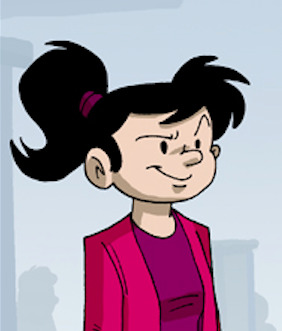
Curmudgeonly Carl
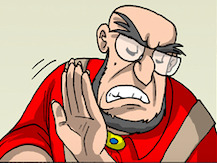
And… this guy I am not even sure has a name.
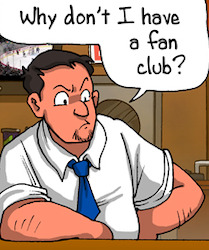
No, seriously. He shows up in like the 61th strip of the series for the first time and yet I never see his name mentioned once

All I know is that he is an accountant, who pities Dobson (for good reason)
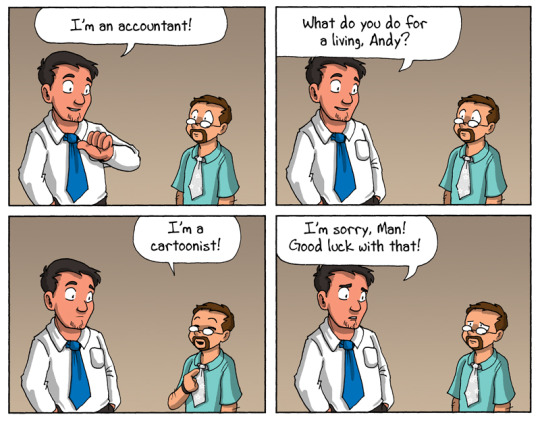
And despite Dobson not liking alcohol, they regularly meet up in a bar as if they are some late 80s comedy duo
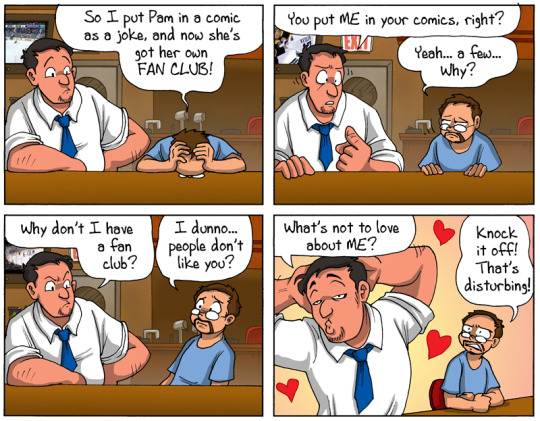
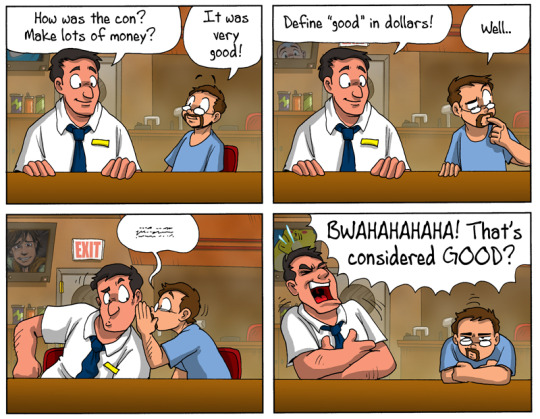
Funnily enough, he shows up way before Pam, who would have her premiere in these strips
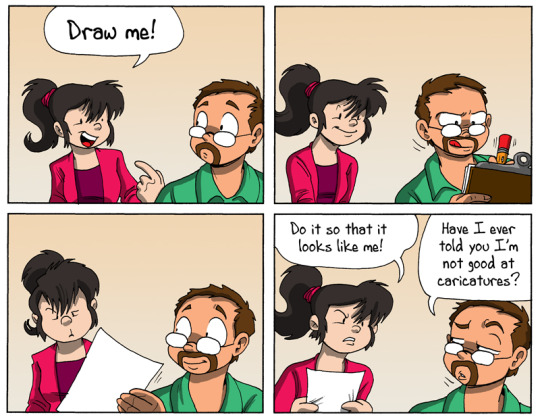
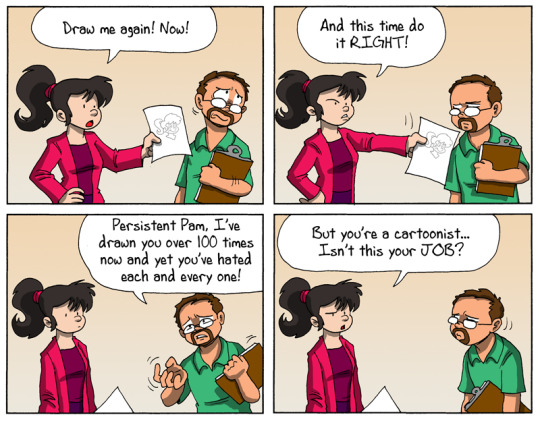
And despite only showing up in a few strips after her premiere (mostly to make “fun” of overbearing and snarky commissioners I suppose…)
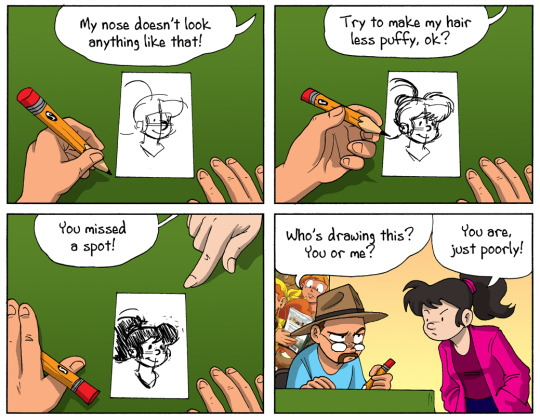
She actually managed something no other character or series by Dobson managed to get: A fanclub
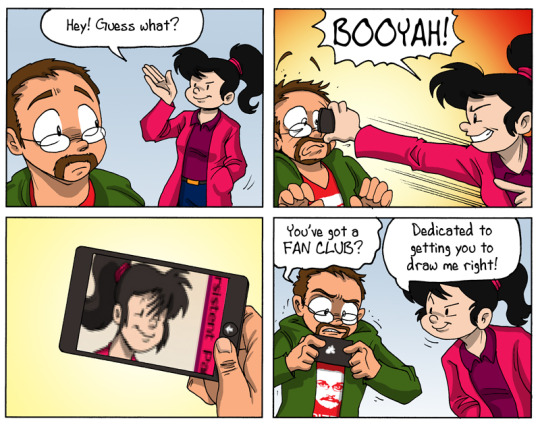
Not that she would really be of any major importance afterwards.
As for Carl, he is supposed to be something like an antagonistic embodiment of Dobson’s “old” art teachers and people being stuck in old ways, who shows up for the following strips forming a sort of arc.
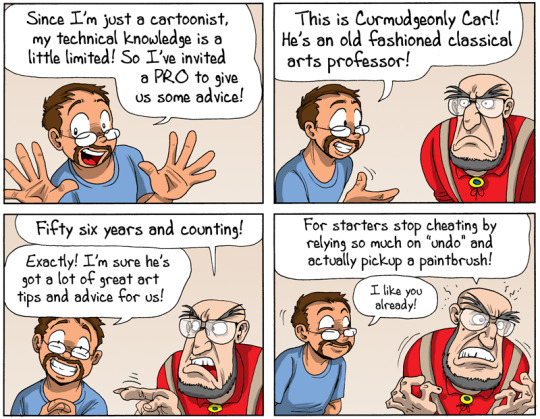
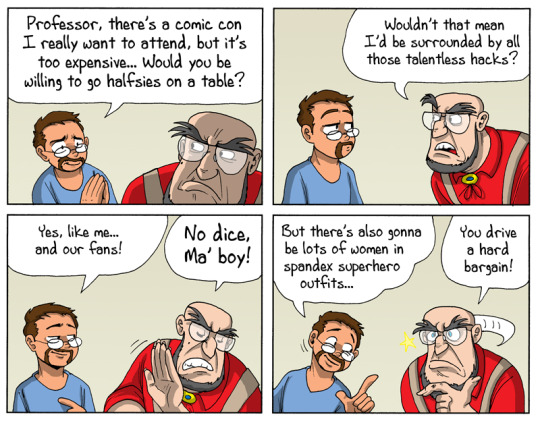
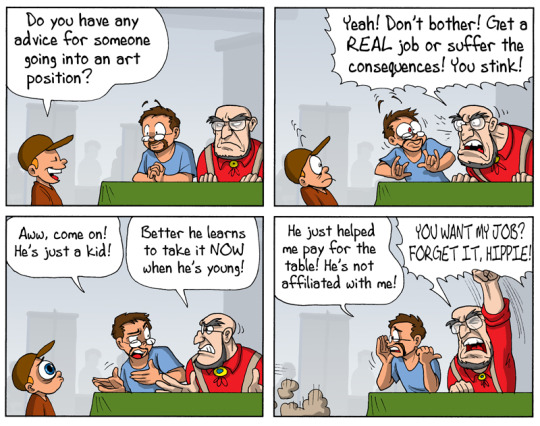
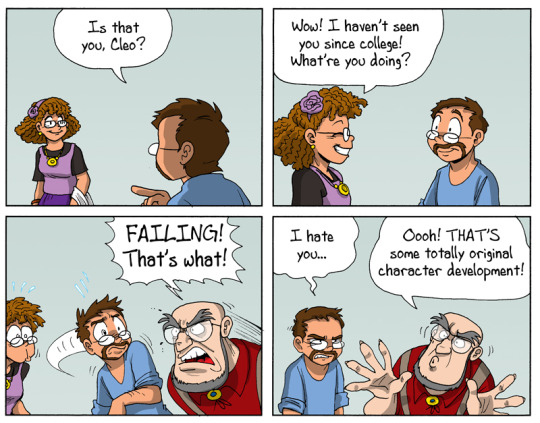
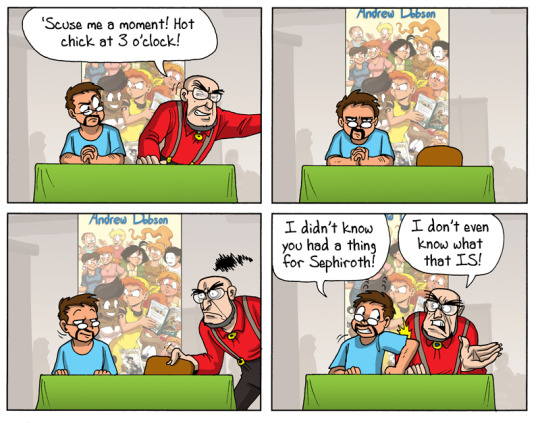
In addition, it is very obvious, that Carl is supposed to be a mockery of people flaming Dobson. Not helped by the fact that THIS character sheet of him made by Dobson assures us, that there were quite a few even less “endorsing” things he wanted to name the character.
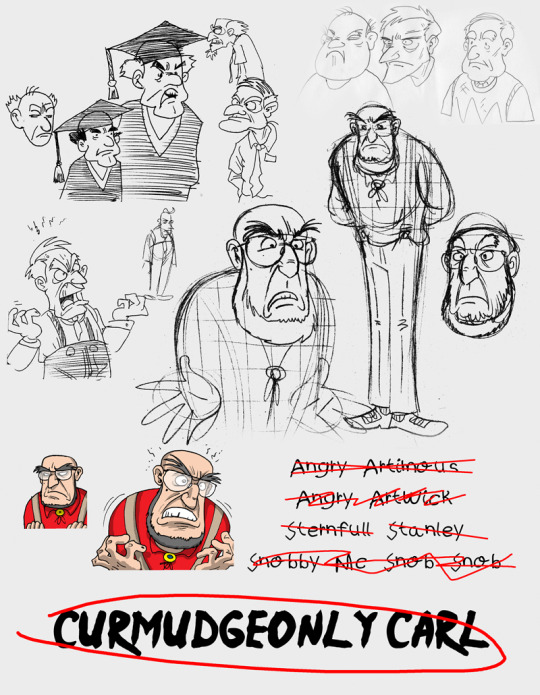
Yet funnily enough, Carl turned into such a popular character with readers, Dobson was essentially “forced” to make him reappear in other strips. Not of the “classical” SYAC strips, but he showed up as the “antagonist” to Tenku in the storydriven multi pagers. Though even antagonist is a strong word, as he is essentially more of a jerkish art teacher and college advisor who is harsh on Tenku, but actually has his best interests in mind. To the point he even offers him to be his “harsher” art critic in the years till he enters college, because he wants to see him grow artistically.
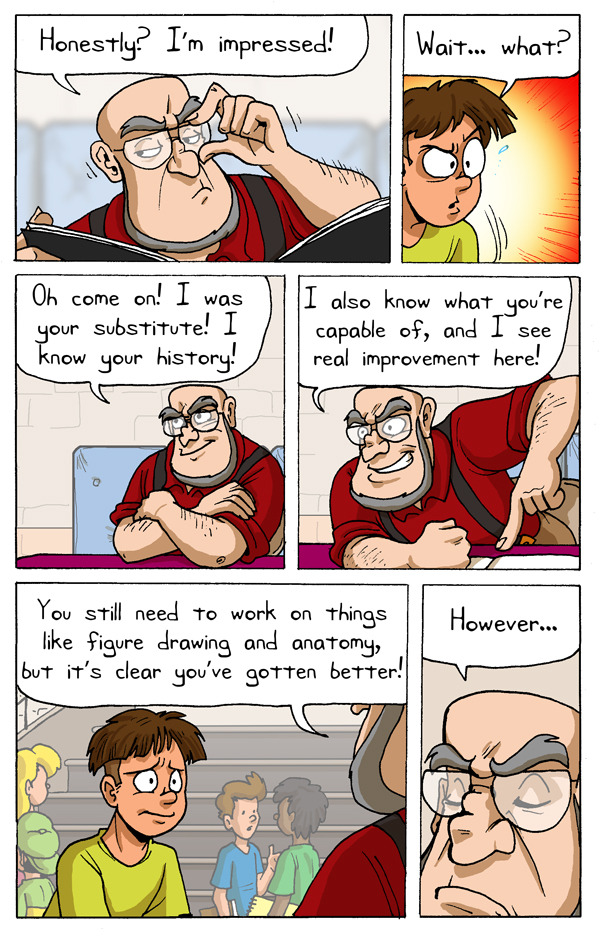
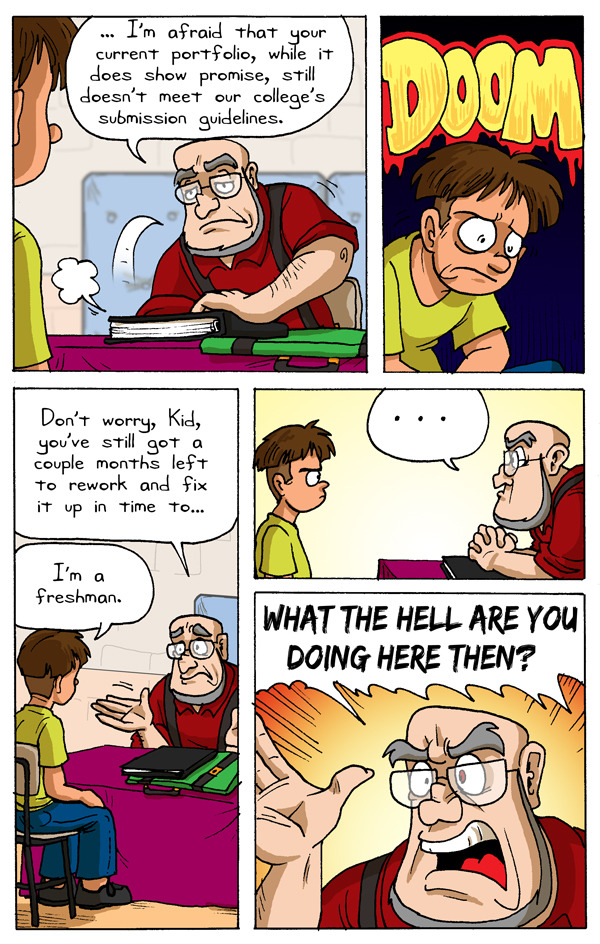
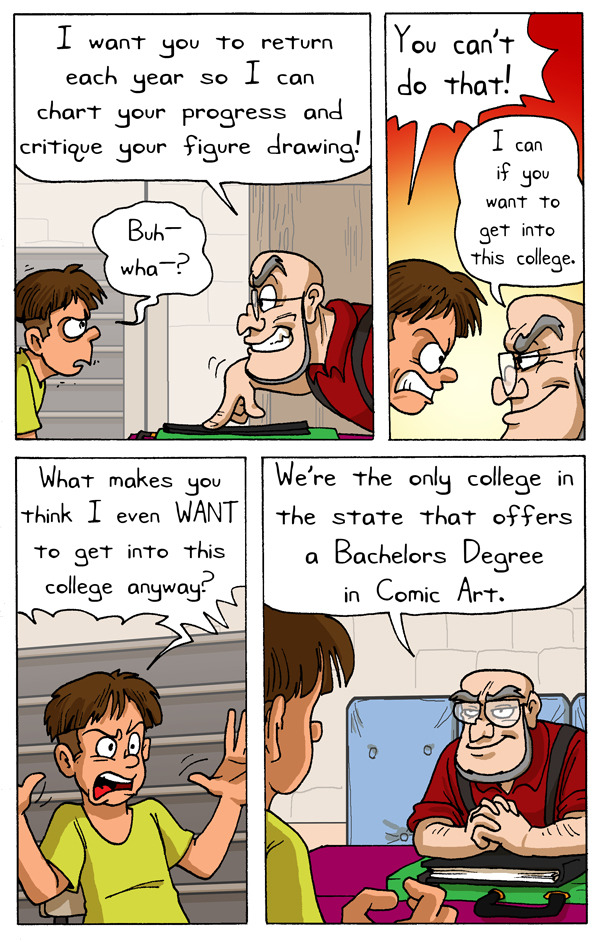
However, Carl was also more of an “accident”. Cause when it came otherwise to tackling criticism or things that irked Dobson (and were not anime related) he would end up more or less creating strips that painted him in a manner where he would supposedly always look like “the better” compared to his opposition or mock it. Which is where a lot of the irk Dobson would earn over the years eventually comes from.
Now to be fair, I do not want to call every comic in that regard “strawmanning”, nor do I want to say that Dobson doesn’t have the right to also mock to a certain extend the mentality of certain “snobs” and so on. For example…
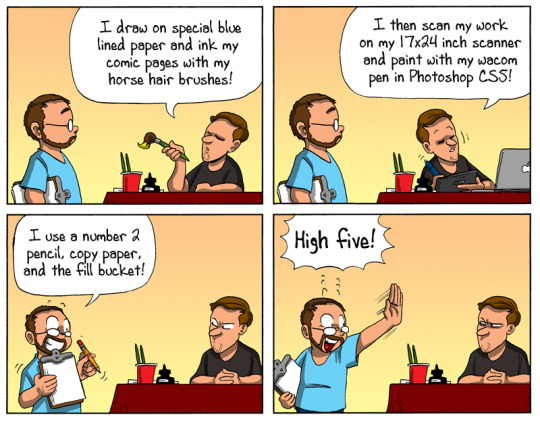
On one hand, I know there are people out there who think they are “special” by having the best tools at their disposal. When in reality you can achieve good results also with less expensive stuff. So mocking that sort of attitude is fine to me to some extend
BUT, when you also make down the line a comic like this…
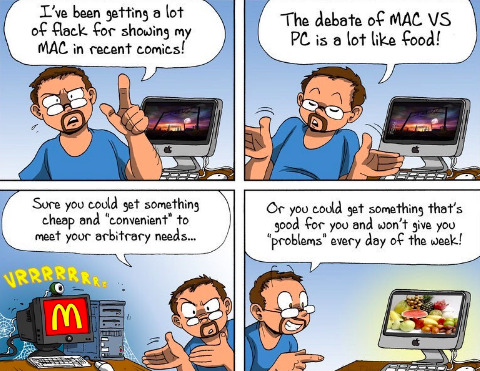
… essentially making yourself come off as a “better” artist or person than others because you have “chosen” the better mass produced crap (btw, that is coming from someone who types this review on a Mac that runs Windows) , then the hypocrisy ends up to be rather strong with you.
Which is also essentially the biggest issue with the strips I am about to show. The hypocrisy of Andrew Dobson. And no, I do not mean the tumblr blog by that. I mean the simple fact, that the content of some of the soon to follow strips gets kinda muddled when you take into consideration some of the things real life Dobson had said and done either at the time or in the years to come. Well that and the way how he tries to mock issues people have with his work, not realizing how he is essentially just reassuring those “silly critics” in their opinions while making his flaws more obvious to people that may have been previously unaware of them.
But enough talk, let me just show you in quick succession examples to confirm said point.
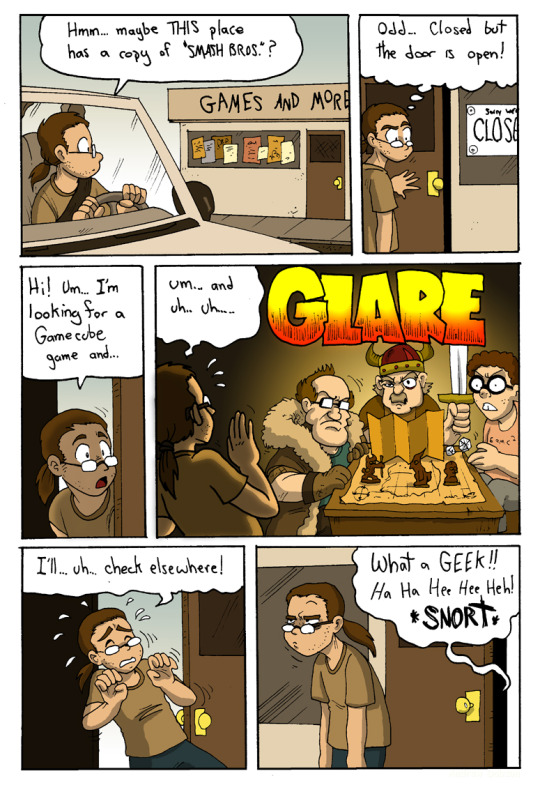
Considering Dobson’s longterm disdain for DnD you have to wonder what the joke really is outside of him portraying DnD players as ugly nerds, supposedly too geeky even for him. Which is hilarious in hindsight as he would years later become a fan of TAZ among other things.
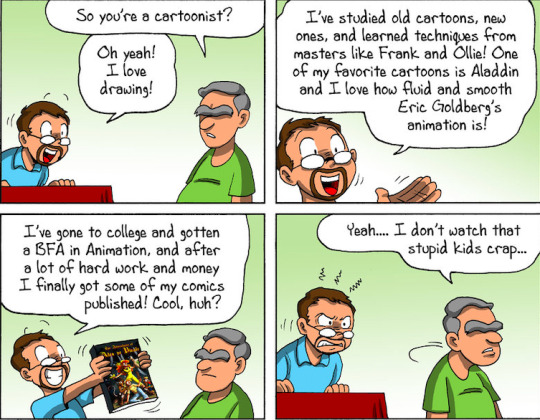
Less hypocritical but the set up is kinda flawed. Like, you are obviously at a convention trying to sell stuff. Why would some old dude not interested in “kids crap” be at the convention anyway? Is he just bringing someone there and just wants to go, but first needs time to belittle your life choices?
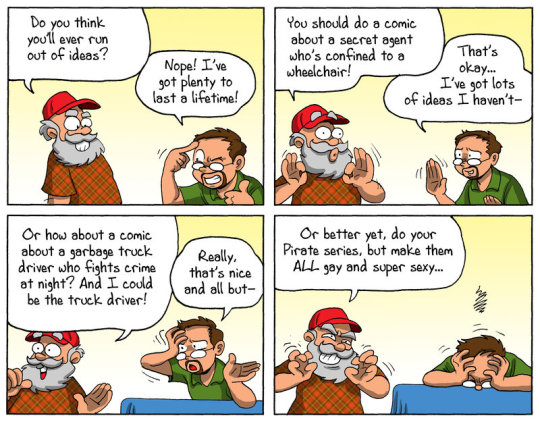
Rather hilarious in hindsight to me. Cause for someone claiming he has ideas that last for a life time and who seems rather distraught on the idea of others giving their input, he turned out to be so in need of ideas. Alex ze Pirate e.g. became from 2015 onward only defined by Dobson talking about the sexualities of his characters (and not even in comic as by that point it was discontinued, but rather in tweets and so on). Formera, which ran heavily on cheap shonen anime tropes ended up cancelled after two volumes, Cabin Rest was a failure after 20 strips, 2019 he relied primarily on cheap comics about Miraculous Ladybug and his understanding of certain genres is so bad, he can’t even think up the most basic ideas for a magical girl story.
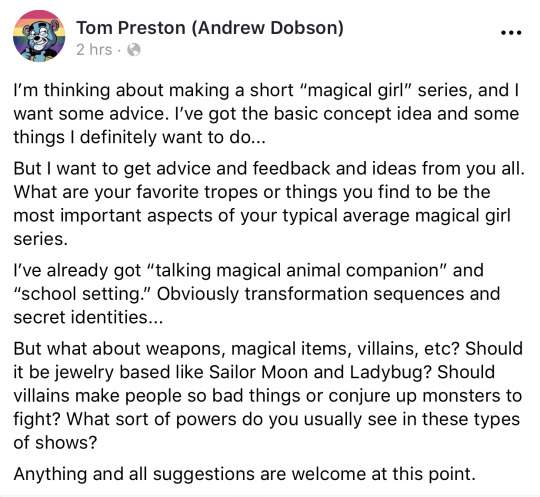
Weirdly enough, that pitch of a garbage truck driver who fights crime? I think that could make for an enjoyable short story about a vigilante a la the Punisher or Sin-City.
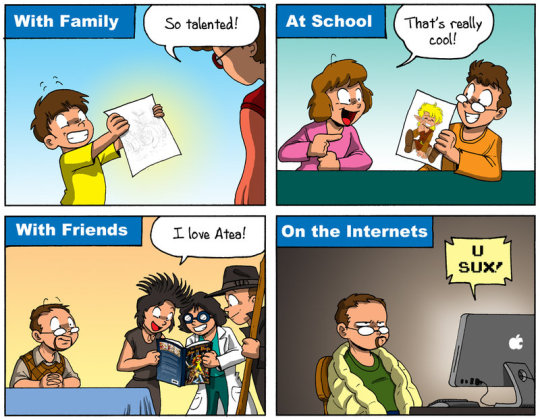
The way Dobson perceives criticism, while also essentially giving a quick rundown how he appreciated criticism in his childhood way better than in adulthood. Yeah, because criticism by your parents as a kid was always VERY constructive. (looks back at certain drawings from own childhood) brrr. And sorry Dobson, but sometimes criticism by strangers is better than criticism from friends. Cause friends may mince their words. Plus people have over time given you quite some insightful criticism aside “U SUX” when it comes to comics. You were just never willing to listen

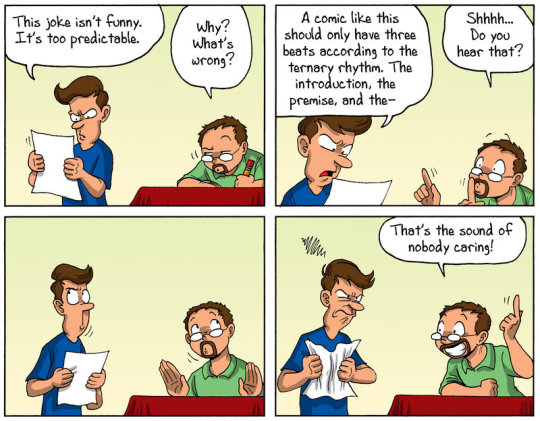
Hey Dobson, you hear that? That is the sound of your career, dying and no one caring.
Yeah, I think someone who made such “brilliant” comedy as in these comics, totally has the right not to listen to what seems to be solid theoretical advice.
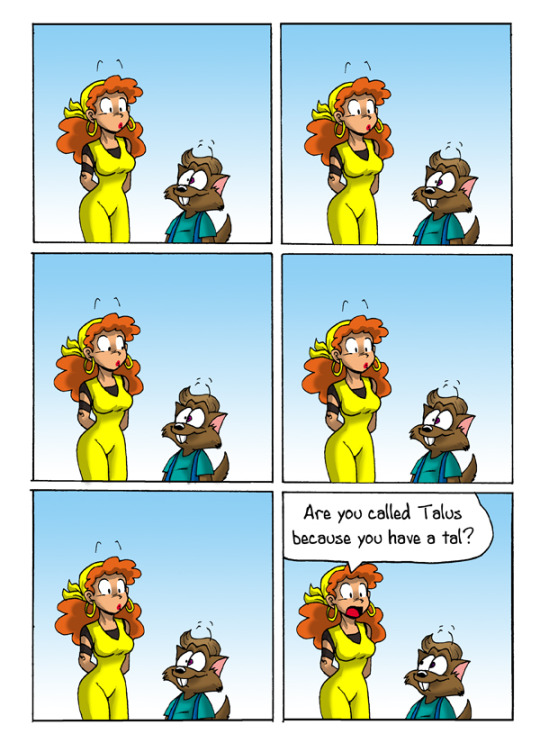
BTW, that Talus comic… I swear to god the worst “joke” Dobson ever told.
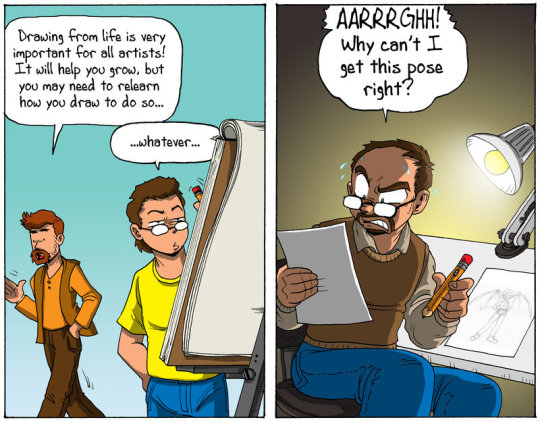
Wow. You essentially make a point why you suck at drawing. While still not trying to change.
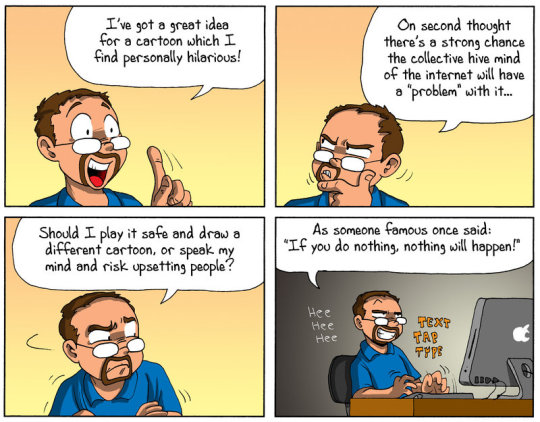
And as someone else once said: Don’t play with fire if you can’t deal with the heat, BLOCK-son!
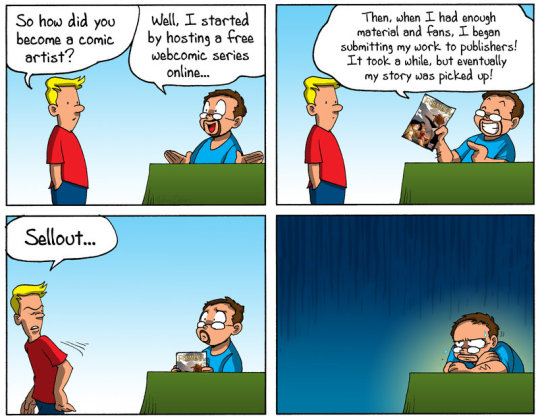
This is not how I perceived your shit over the years. See, on one hand it is true that Alex ze Pirate e.g. has its own webpage to read the comic for free. HOWEVER most of his comics Dobson would hide from the start behind a paywall. The idea being that he would e.g. put a small reading sample of 10-15 pages up somewhere and then expect people to buy his comic for full price to get the rest. And you know, if you are e.g. a professionally published writer, that is fine. But when your average art output looks like THIS
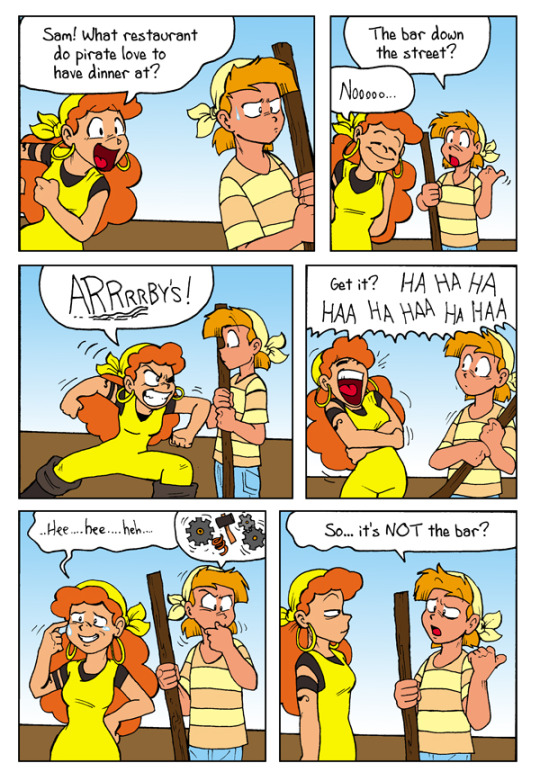
And you expect people to pay more than 10 dollars for something that is only around 70 pages long while most people can get 200+ pages for the same amount of money that look like this…
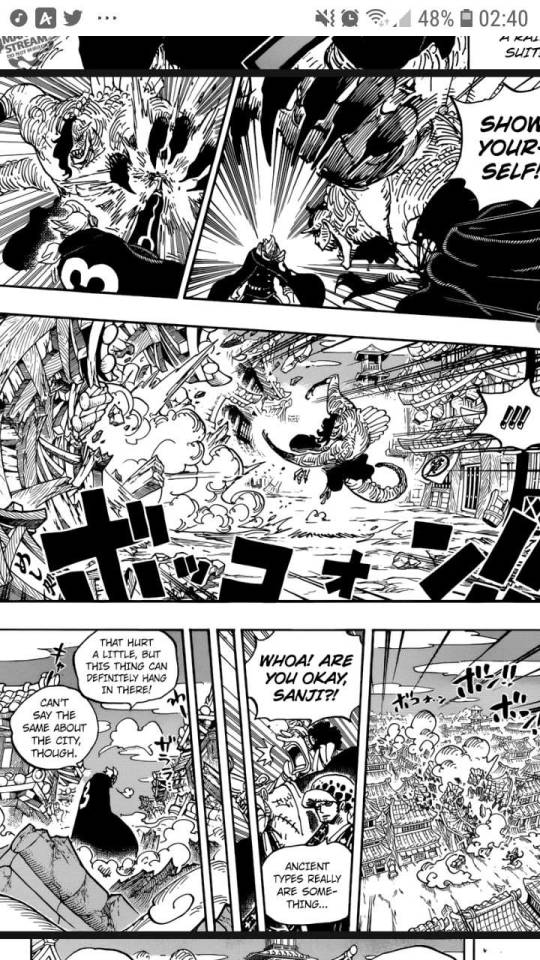
You can frankly go and screw yourself.
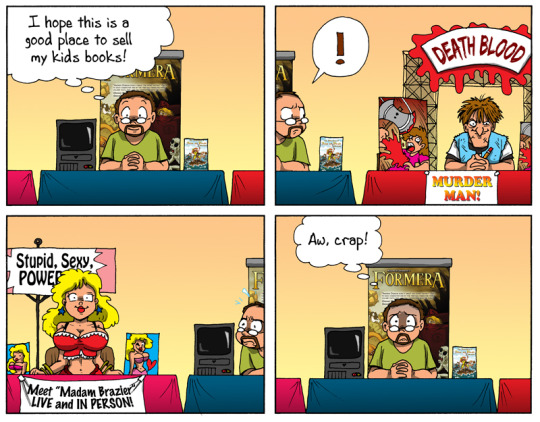
On one hand I get that the joke is meant to be, that as an independent content creator you may find yourself in a weird spot where your “child friendly” work may be put in a palace between edgier stuff other creators sell at conventions. On the other hand, I find it rather insulting in hindsight, that self declared feminist Andrew Dobson portrays such competition as either psychopathic murderers or stereotypical cartoon bimbos. If modern day Dobson saw the same strip by any other person, he would be insulted on behalf of the female that she is portrayed as a bimbo, when she could also be a very smart and attractive woman who knows how to tell brave and sexy stories.
Also, I have read your “child friendly” stuff, Dobson. I would call Atea or Alex abusive bitches who like to bully orphans but child friendly? Not to forget that your work is so basic and shallow in depth, it’s like the someone tried to create a chimera out of some of the worst traits associated with Dora the Explorer, 80s toodler cartoons and the Fairly Oddparents.
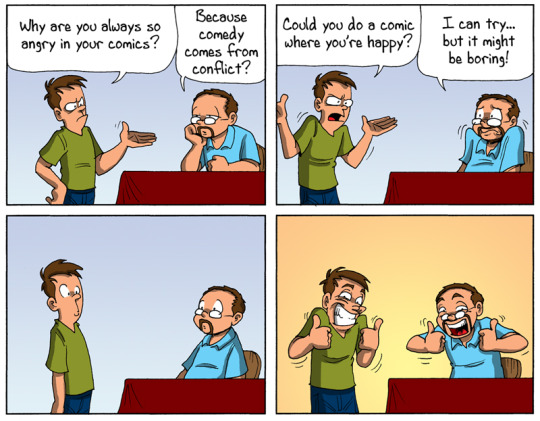
I frankly hate this theory on comedy. It is true, a lot of comedy can be deprived from conflict, misunderstandings etc. Looney Tunes, Tom and Jerry and other cartoons as well as screwball comedies such as Rat Race can depend on it. Heck, one of my favorite comedians of all time is Christopher Titus, who based his entire career on the misery and absurdity of his life.
But comedy is not just defined by misery and conflict.
There are for example also the following theories when it comes to comedy…
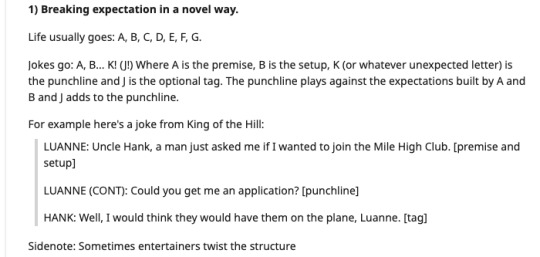

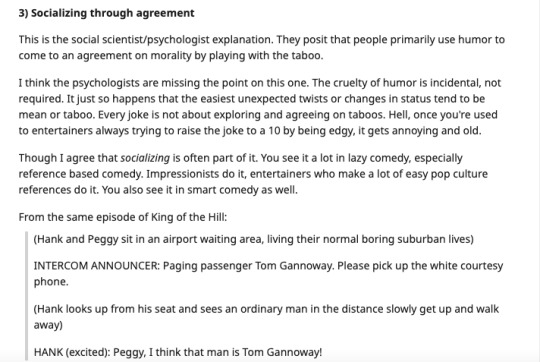
And to get back e.g. to Titus, yes, he has build a lot of his comedy on the bad stuff that happened in his life. But he is also someone who in his comedy has build a lot of punchlines on the absurdity of certain situations he has been in life but which in a way have enriched his life positively.
What I am trying to say is, comedy (and entertainment in that regard) does not just have to be defined by misery. And all things considered Dobson, you could have really tried to also just make comics wherein either you or your characters are just happy with their situation in life.
For example, this page from an Owl House fancomic?
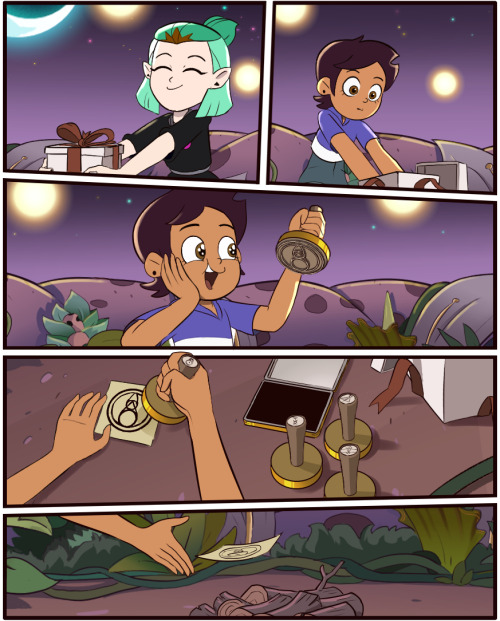
I think it holds more entertainment value than your “joke” right here, despite not even telling a joke.
Simply because as a page overall, it tries to convey a positive emotion. Which is more than I can say about the strip.
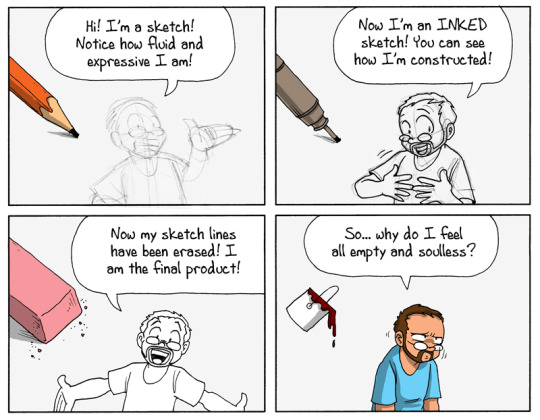
Because of a lack of different level of thickness regarding your lines, which would trick people into perceiving depth, the fact that the fill bucket and shade layers can only do so much to cover for the rather monochromatic dull nature of your comic, the fact that your characters are not really all that complex and look rather simplicstic even compared to stuff from a comic like this…
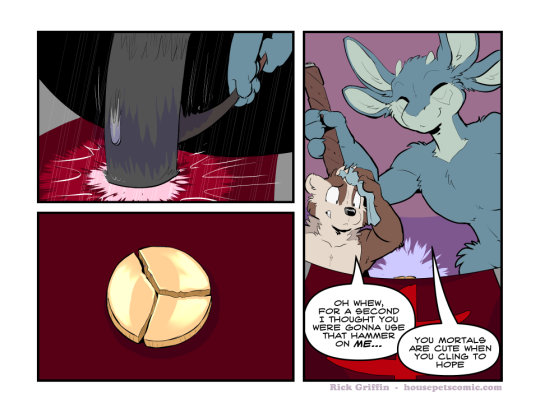
And that is just coming from the top of my head as someone who never studied art. If any reader has something to add, I am willing to listen
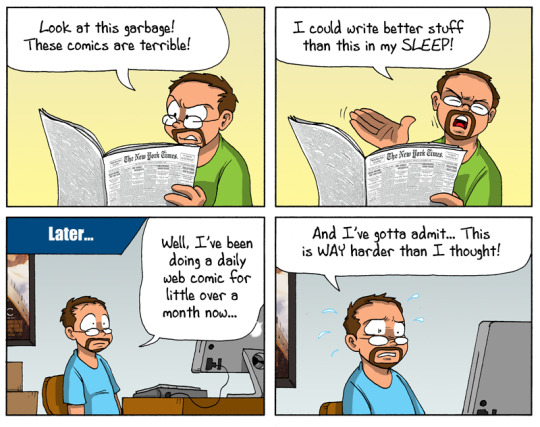
And considering you could in later years never keep up to any release schedule, which among other things resulted in only three SYAC strips in total being released in 2016, I say go fuck yourself. Not to forget that even some of the worst newspaper comic strips out there tend to actually find a decent following and good jokes eventually, otherwise they would not manage to stay popular for years, if not even decades.
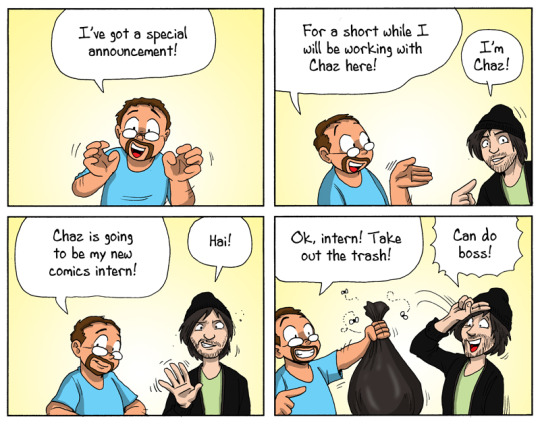
As someone who has worked internships a lot in life, I just want to say fuck you in all our names. Glad to see you having just as much respect for interns than any other scumbag on the planet. Probably even less respect, cause you know, in some places interns tend to get paid.
Also, there is supposedly an entire real world story going on about Dobson having worked at his former university at the time the comic came out and Chaz is based on a fellow intern.
Things are unfortunately rather vague in that regard and only hold up by demonstrative evidence such as the name of Chaz showing up in certain pages of the university and Dobson’s internship being mentioned somewhere.
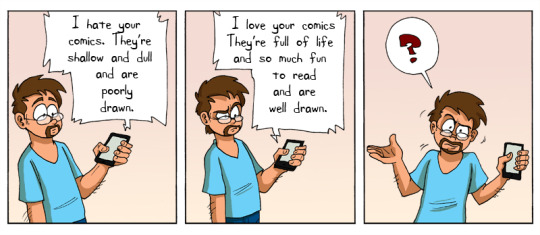
Well, would you look at that: People have different opinions on your stuff.
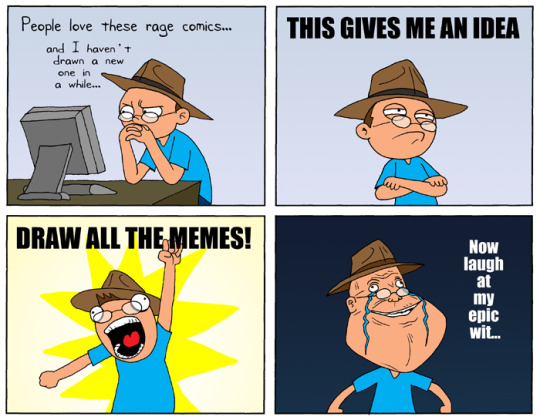
There are ways to draw memes funny and then there are ways to fail at them
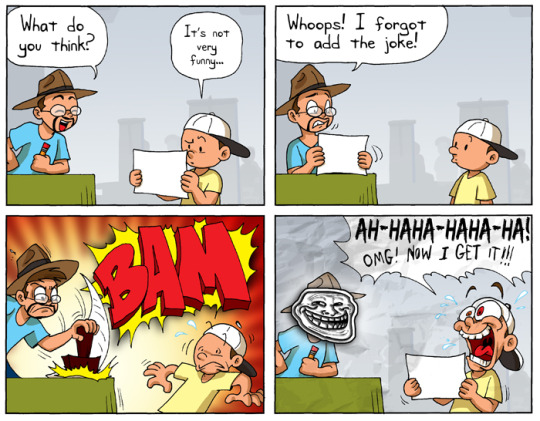
You failed.
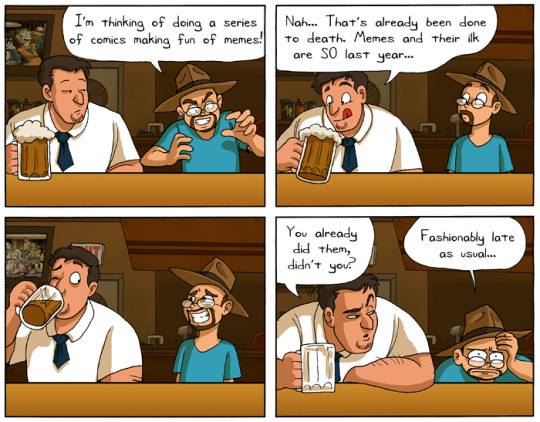
Funnily enough, that comic rings a lot truer to text than you expect. Considering how Dobson would often emulate certain aesthetics in his comics of shows that were rather passee by the time he published his stuff, plus how he will obsess over certain trends and games for years to come (like Skyrim or his Quiet Hate Boner) while also being unaware about current trends (how do you e.g. not have heard of My Hero Academia by 2018 at least once by accident?) Dobson has always been kinda late to the party. Missing the “zeitgeist” of nerd culture and as such never quite finding an audience.
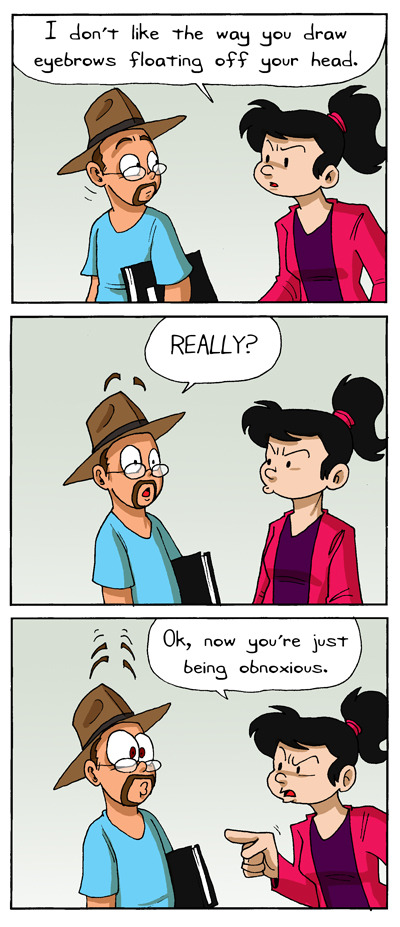
Yeah, what Pam says. Not helped by the fact that yes, the floating eyebrows are real. Look at some earlier sketches or “professionally published” comics by his and you will see that each time characters get excited, their eyebrows will suddenly split into sets of three and float higher than Pennywise’s victims.
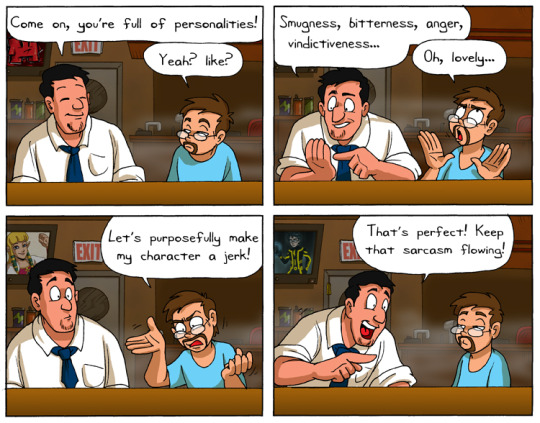
Ironically, that fits real life Dobson at the time and later on even more so than this comic version did. Sorry, but what am I supposed to call a person who has an hate boner on anime for years for superfluous reasons, made Danny and Spot a “gaming webcomic” deliberately to piss on non Nintendo fans and has admitted in some by now deleted youtube video, that he kept a list of usernames from an old forum just to remember even years later the people that were mean to him online?
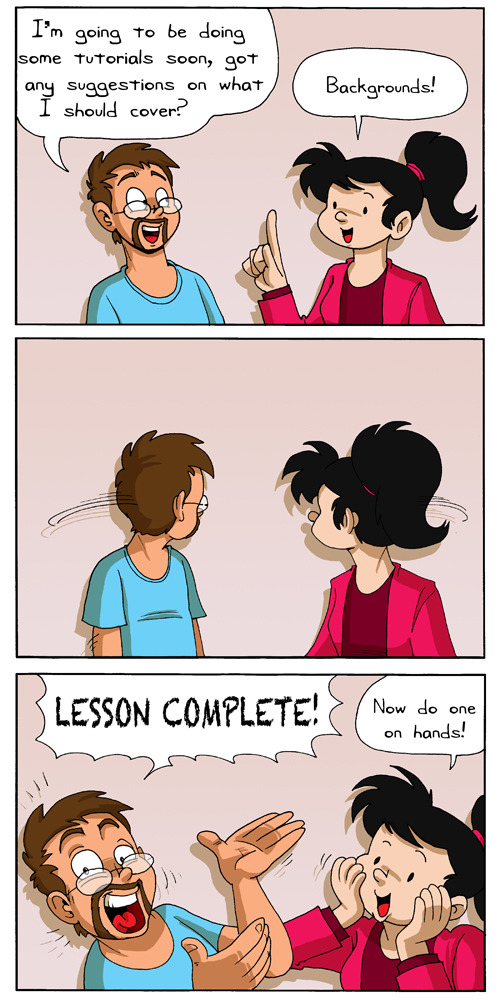
Fuck both of you. I do not expect the Sixtin Chapel in the background, but something to filll up the empty space behind you is at times needed.
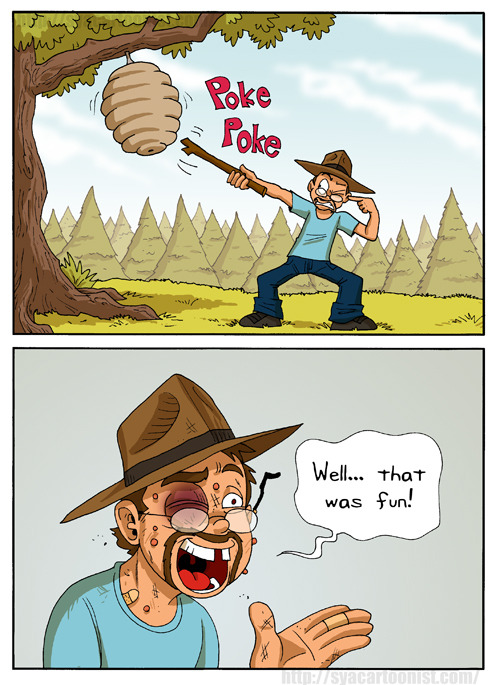
The comic here is actually called politics.
… ironic how things changed once a certain reality show host turned president.
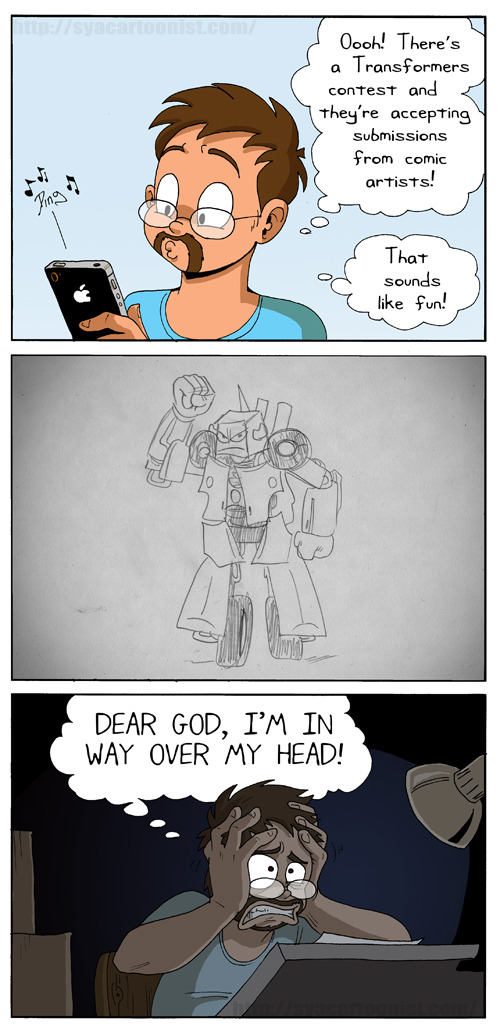
Jesus Christ. I am not even that much of a Transformers fan (Prime fan for life however) but even I know that this is not supposed to be what you design the head of a Transformer like. Not even if they ever produce the Transformers equivalent of Teen Titans Go.
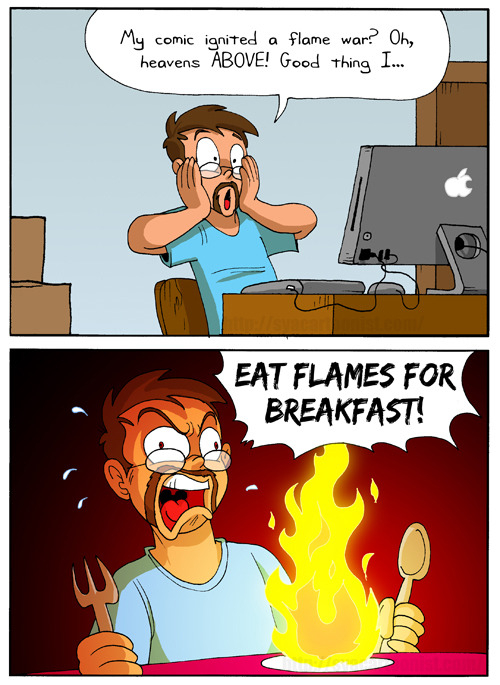
Too bad you still can’t stand the heat, otherwise you wouldn’t have completely disappeared last year.
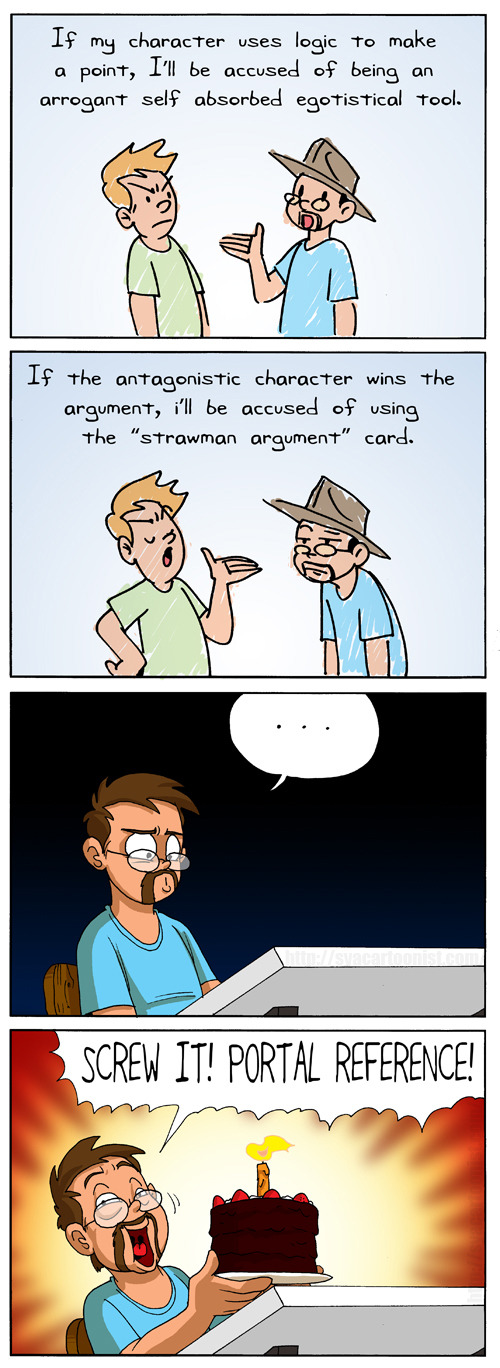
When you know you are in a no win situation, and still manage to choose an even dumber option to escape. I really don’t get it. I just think the Portal reference makes the comic dated and Dobsn’s attempt at a smug face looks so stupid. Like his cheeks are falling in and his mouth is about ready to get raped by a garden hose or something.
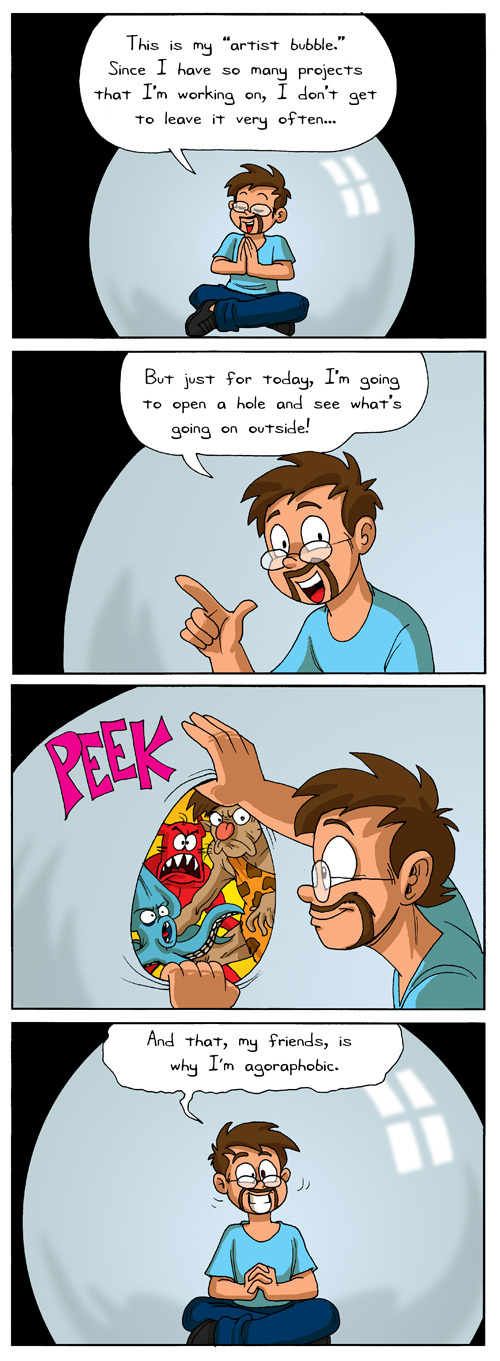
Yeah, considering Dobson’s later constant need for safe spaces and to be in control of a situation and the narrative, which led to so many blocks over the years… if you know anything about Dobson, how this comic becomes harsher in hindsight is rather self explanatory. I just want to say one thing: There is a difference between genuine agoraphobia and just wanting to be by yourself. And I think Dobson just prefers the later on average. Which is okay, but humans still need to interact with other human beings in one form or another, even just for the sake of keeping their mental health stable. Why do you think are so many people getting depressed in times of covid lockdowns, despite many having all sorts of technical gimmicks at their disposal to at least keep boredom at bay?
And by putting himself into a bubble like that, I think Dobson has deprived himself of some of the most basic human interaction, which was likely a severe factor in his mental degeneration over the last years.
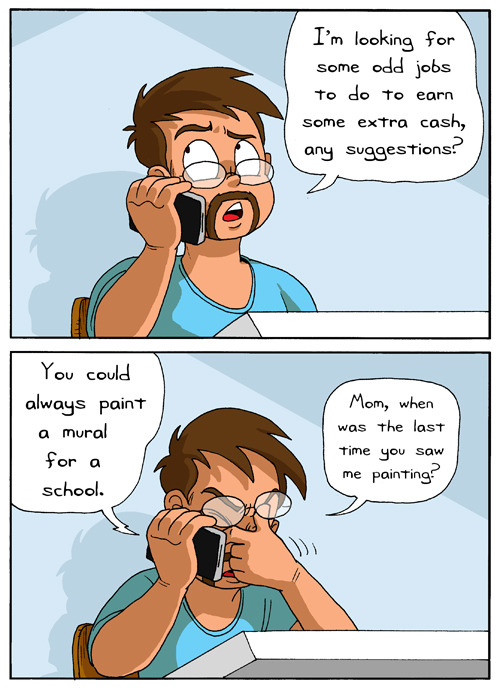
It is still a valid suggestion! Just draw some cartoon characters or a nice fantasy scenario on a mural and earn yourself some bucks. Just be sure they are not by Disney or the Mouse will tear down the school!
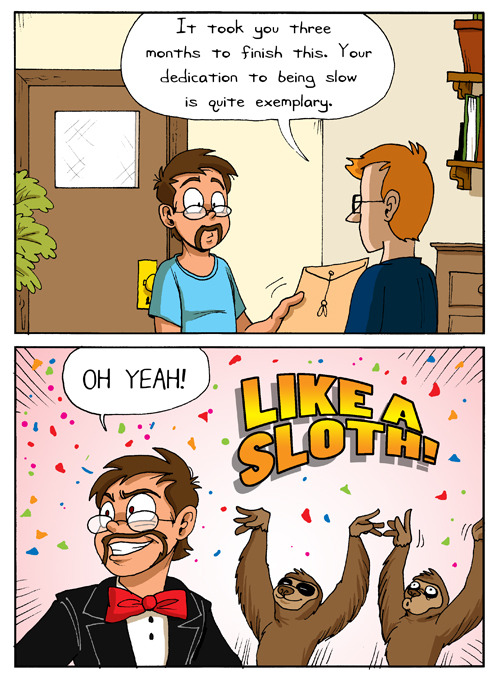
… Just google up the words Andrew Dobson and Samus Aran commission by ED and you will see how this comic just further shows how much Dobson seems to actually be proud of being an unproductive asshole.
And by the way, I know that any form of artistic work takes time. Just writing these review posts takes a lot of time for me. But that doesn’t change the fact that people should post and create stuff in a timely fashion, especially when there are e.g. deadlines to hold up too. And by the way, Sloth’s don’t have fingers, they have claws!
And that is it.
Sorry if I missed anything folks, but I just saw how many pages in word this is already filling up, so I call quits for this part here right now. I think I made my point about how Dobson trying to badly deflect arguments people may make against his art and work ethics via jokes clear enough, while also showing some posts that are either harsher or hilarious in hindsight.
Next time we will however address one certain issue about our main character, that has been not directly addressed here. In the meantime, have a little fun video that shows hopefully how entertainment and a certain amount of comedy can be gained NOT via misery.
youtube
#adobsoncomic#Andrew Dobson#Tom Preston#comic#webcomics#syac#so...you are a cartoonist#review#master review
67 notes
·
View notes
Text
a deadly education is tone-deaf at best and racist at worse; not the cure to jkr anyone was hoping for
Harry Potter’s massive cultural impact means that we haven’t seen the last of magic schools set in Britain, and we probably won’t for a long while. In some ways, the fantasy genre’s response to Rowling’s work is tiresome. In others, it’s exciting—because a generation of readers and writers have grown up to bring their own perspective to the limits of Rowling’s work and push it beyond the limits of its author. However, if you’re looking for a transgressive magic academy book that interrogates the limited morality, inclusivity, and perspective of Harry Potter, you should put Naomi Novik’s A Deadly Education back on the shelf and keep looking.
A Deadly Education tells the story of Galadriel “El” Higgins, a half-British half-Indian sorcerer attending a magic school where the consequences of any mistake might mean sudden death. El is a loner by nature and circumstance, but walking alone in the halls of Scholomance might mean being attacked and devoured by one of the school’s monsters. This puts El on a crash course with Orion Lake, the shining hero of her year who takes it upon himself to save the lives of his fellow students, including a less-than-grateful El.
The set up honestly sounds pretty good—a prickly protagonist, a heroic rival-slash-love interest, a deadly setting, and the potential for deep lore in magic and world-building. Unfortunately, not only does Novik fail to deliver on any of the premises’ strengths, she also chooses to weigh her narrative down with reductive, tone-deaf, and downright racist details.
El’s particular class of magic relies on language. El speaks English and Marathi, and picks up Sanskrit, Hindi, Latin and Old English in her study of language-based spells. It’s a little uncomfortable that Novik lumps dead and defunct languages like Latin and Old English together with actively spoken ones like Mandarin, Hindi, and Spanish, but that isn’t where Novik’s faux paus end. El approaches languages like computer programs to be downloaded onto her hard drive. Despite languages being the basis of her magic, she has no personal connections to the ones she’s speaking. She views other students and their languages the same way, identifying groups of students as “the Mandarin speakers”, “the Arabic speakers,” etc. Novik seems clueless about the relationships between the languages she’s building her world’s magic around, putting Sanskrit tombs in Baghdad and declaring that the Scholomance has a library aisle containing all of India’s languages. (About 800 individual languages are spoken in India, fyi.)
This clinical approach to diversity extends from language into character. El doesn’t try to make many friends, and honestly it’s not hard to see her classmates don’t try to befriend her, either. She doesn’t describe her classmates as people—she describes them as assets. And while that could be explained away by the premise that half her classmates won’t make it out of school alive, and El needs allies more than friends to survive, it doesn’t make it any better when El refers to others exclusively by the language knowledge they offer her. A character named Ibrahim has no personality or backstory, but he conveniently pops up when El needs someone who knows Arabic. A character named Kaito is thoughtlessly grouped in with the Mandarin speakers. An Argentine character exclaims in Spanish when she’s excited or relieved. There’s an uncomfortable distinction between the languages that get written out in the text—Spanish, French—and the ones that get narrated away—a character exclaims in Mandarin.
Novik goes out of her way to let us know that the population of Scholomance is diverse. There’s a group of South and West African students (only one of whom is named, and none of whom are important). There’s a “civilized” enclave of magicians in Toronto who value family and human life more than other groups. One character might graduate and go to Bangkok, but he’s looking to secure himself a place in Shanghai instead. Naomi Novik really knows the names of cities on at least four continents, and she’s not about to let you forget it!
But aside from names, languages, and cities, Novik has given no thought to what diversity means, or who these characters are if they come from diverse backgrounds. El calls on “Mandarin-speaker,” Yi Liu, exclusively by the name Liu. Is Liu meant to be this character’s first name? Or her surname? El doesn’t call anyone else by surname, but Liu is a Chinese surname, one of the most common in the world. El’s father is a Marathi-speaker from Mumbai, but El has no personal connection to Indian culture. Her father’s family prophesied that El would be a destroyer, and other than that rejection El has nothing to say about India or half of her culture. She refers to her Indian relatives in clinical English descriptors (my father’s mother, my great-grandmother, my uncles), even though she is purportedly fluent in Marathi and should know words like Panaji, Aaji and Kaka. El says that her Indian family is from an old Hindu enclave, and yet they have djinn as servants. (Djinn aren’t a typical part of Hindu cosmology, though they are a significant part of Islamic texts.)
Making El biracial seems like an afterthought, not something that affects her character in any way. It just creates some truly unfortunate optics, like when El goes on a three-paragraph description of how unnecessary she finds showers and how dirty she is at any given time. El’s father died making sure her pregnant mother (and therefore, El herself) would live, and yet El barely thinks about him. His name is mentioned once in the entire book. El complains that (presumably white) British people “assume she speaks Hindi” or call her the color of weak tea. But her Indian heritage is a veneer placed on top of a character who is otherwise just a default white protagonist.
All this adds up to a character (and a world), that reads as nothing so much as colonial. El feasts on the languages of others for her own edification, power, and survival, but she doesn’t see her classmates as people, and she doesn’t see language as a living thing related to real cultures. And I’m given to believe that Naomi Novik holds the same views, what with how she throws around the word “mana” as part of her world-building without considering its roots and real-life meaning to Polynesian and Melanesian peoples.
However, nothing makes the cultural tone-deafness of this book more evident than this passage:
Dreadlocks are unfortunately not a great idea thanks to lockleeches, which you can probably imagine, but in case you need help, the adult spindly thing comes quietly down at night and pokes an ovipositor into any big clumps of hair, lays an egg inside, and creeps away. A little while later the leech hatches inside its comfy nest, attaches itself to your scalp almost unnoticeably, and starts very gently sucking up your blood and mana while infiltrating further. If you don’t get it out within a week or two, it usually manages to work its way inside the skull, and you’ve got a window of a few days after that before you stop being able to move. On the bright side, something else usually finishes you off quickly at that point.
El’s pithy commentary about imminent death aside, I have a hard time reading anything but casual and thoughtless racism from this passage. The nefarious and deliberate myth of dreadlocks being unhygienic (and by extension, Black people being endemically dirty) is pervasive to this day. And Naomi Novik decides to include this passage in a book that has no major Black characters, in which dreadlocks never even come up in any meaningful way, just to remind us that in this magic world of hers, dreadlocks are dirty! Monster insects nest in them! The consequences are death! There was no good reason to include this passage, and all it does is draw on inaccurate and racist myths and perpetuate them into a world where anti-Black racism is never contended with. Although, I suppose, why would it? El never has need of any languages from the West or South Africans.
A Deadly Education bills itself as a subversive, even feminist, response to Harry Potter. But just like J. K. Rowling, Naomi Novik is a white author who uses other cultures thoughtlessly to build her own magic world. Other cultures and peoples exist, but only to serve the aims and needs of white (or mostly white-coded) characters. Novik has no empathy, no care and apparently no ability to Google anything about the cultures she wants to draw on. And the result isn’t just insulting—it’s boring. The world-building in this book is as dry and dusty as any history written by 19th century British colonizers.
Using some foreign names and making your protagonist biracial does not shield your work from racism. It does open you up to more pitfalls in depicting other peoples and cultures, if you don’t care to look out for them.
It would be nice to close by saying that despite its flaws, A Deadly Education is an enjoyable book. But it isn’t. It’s just a badly-researched, emotionless story told by rote.
194 notes
·
View notes
Text
Pixar’s Soul: Review and Reaction
The first sentence I’ve always used to describe Pete Docter and Pixar’s Soul since watching it has nothing to do with the plot. It’s instead is a starstruck comment about the music: the movie begins with a cover of a Duke Ellington classic - Mercer Ellington’s “Things Ain’t What they Used to Be.” It ends with a jazz rendition of a classic from several decades later - but still quite a bit in our past - Curtis Mayfield’s soul classic “It’s Alright.”
On a personal level, this would say way more about Soul that most other descriptions of it might to get me to watch it - were I not the kind of person who was absolutely intent on watching the movie day one regardless. Though I am myself a few generations after either of those artists were around, their music has been a part of my life since I was a kid and are essential on any playlist in my opinion. Curtis Mayfield’s music, especially, deserves all the love in the world, and hearing by surprise someone cover his work in a Disney movie made my entire day - and it would have, even if the film weren’t the meaningful ride it is.
But before we get into all that, lets also look at those songs. “Things Aren’t What They Used To Be” is played a la a teacher and a higher school band class: the students are learning and a bit difficult to listen to, while the music-loving teacher cringes at the front. But the choice of song tells us a lot. It’s a jazz standard: which means when it comes to jazz, it’s one of the essentials - a tune every band learns to play, and every jazz fan has heard before. The teacher is a jazzman - you can probably guess who - and the whole time he’s listening to the song you can hear him wanting to sit down and make it sound as perfectly as he hears it in his head. Remember that analogy. Heck, when you watch or rewatch the movie, remember the mindset Joe - because that’s who that teacher is, Joe Gardner, is in for that whole teaching scene in the first place: and remember how important the desire to make things perfect is to the greater story the movie is trying to tell.
“Things Aren’t The Way They Used To Be,” indeed. By the end, you have to wonder: isn’t that the point?
Now the second song. “It’s All Right” is a smooth number for dancing to - not frenetic and wild dancing, but more a slow jam sort of vibe. BUt it’s the lyrics that are the most befitting the themes of the movie. Like several of Curtis Mayfield’s tunes “It’s All Right” is an ear worm of an R&B number that’s actually about being a peace with yourself. “You’ve got soul” - ha, I get it - “and everybody knows, that it’s all right.” Or, to quote instead my favorite verse of the song (I did say Mayfield was one of my favorites): “when you wake up early in the morning feeling sad like so many of us do, hum a little soul, make life your goal, and surely something’s gonna come to you.” This is before the spoilery part of the review, but they could not have picked a better song for the movie’s themes if they wrote it themselves.
Soul, after all, is ultimately a movie about how the things we do, the things we love, even the things that define us and should make us feel good in and of themselves, can become a shackle that prevents us from feeling the things that we adopt them to feel. Dreams - especially dreams deferred - can consume us rather than uplift us, and sometimes in pursuing them we may forget to live, and forget that others are living in this world and dreaming alongside us.
This, as you might be able to tell from the way I’ve described it, is a movie with a very strong, and most importantly very well related message that - as we’ve come to expect from Pixar’s output at this point - touches us in our jaded adult hearts. As a creative person with lofty dreams who has almost literally been where the protagonist is in this film - and as many in my generation also have gone through - it definitely feels like a film that was directed straight at the generation that first watched Toy Story as kids decades ago, and now feel somewhat unfulfilled as adults going into the world. Same as Inside Out (a movie specifically designed to make adults cry, in my opinion), the SparkShorts and arguably Onward (I definitely related to Bailey, some). So much like my review of Jingle Jangle, you have something of an idea where this review is going to go before the jump, but that’s okay. This movie did have ups and downs, but its just the kind of up Pixar is good at: they know they’re audience, and especially did for this gem. By the end, it can definitely make you feel as though you too can make it through, as long as you have a little Soul.
However, it is not just the message, but the nuances and skill in which they relate that message (and they do come close to making decisions that could have ruined it, at times), which means it’s very difficult for me to put why this movie works into a review without SPOILERS. If you want to avoid SPOILERS, don’t hop over the pic and instead treat the above as your non-SPOILER review.
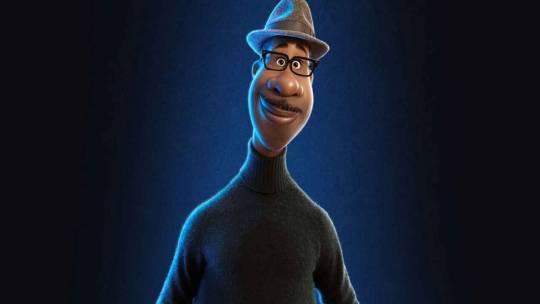
Soul is the story of one Joe Gardner, played by Jamie Foxx a brilliant early middle-aged pianist with lifelong dreams of becoming a jazz musician, who we first meet teaching part time band at a local high school. The inciting incident is an interesting choice: Joe gets a major offer - he can come on as a full time teacher, making his occupation a career! But Joe believes very much in the adage that “those who cannot do, teach” - in the sense that he wants to do. He cannot accept the position - over the advice of his mother - because that would mean giving up on his dream of being out there playing music for a living: a dream that has consumed him his entire life but which has given him nothing in return.
Until now.
While agonizing over the decision to take the position, Joe's life then gets a big twist: a former student of his, remembering him fondly years after they knew each other, has a hook for him to join the band of a famous jazz singer and saxophonist - played by Angela Basset (side note, here: jazz has long had a reputation for being something of a boys club, especially for certain instruments, and the choice to have the lead saxophonist and famous idol whose band Joe wants to join be a woman is a great choice that my entire jazz-loving and living family took note of). Joe is instantly elated - he rushes over and naturally aces the audition for the part in the band, and so is on cloud nine...
Until he dies.
That’s when the plot really starts. Joe falls down a manhole like an astronomer in an aesop fable, and is now stuck on the slow escalator to The Great Beyond. Naturally, he’s not for that and tries to escape - pursued by overeager spiritual soul-accountant Terry - ending up in the Great Before instead, and leaving his body in a still-living coma (the implications that coma patients in general are people who are choosing not to die when they’re “supposed” to is something I’m sure the writers didn’t intend, so I’ll let it slide). There, Joe is pressganged into mentoring a pre-prepared soul for birth, helping them find their Spark for life - which Joe interprets as the one true purpose and dream they are meant to fulfill. Once he gets them their Spark, he will be able to steal a badge his mentee earns as fully fledged souls and . Luckily for his intended very morally suspect intent on spiritual larceny, he ends up with Soul #22 - and that’s #22 out of hundreds of billions - a soul who has simply never found a Spark despite having been in the Great Before for thousands of years. #22 doesn’t want to live, so she agrees to give him her patch when they’re done. But no mentor before has been able to inspire her (well, technically #22 is genderless, as she demonstrates in the story at Joe’s request, but she is voiced by Tina Fey), so how can Joe? When that proves to be too hard indeed, #22 instead decides to help Joe get back - mostly because she’s intrigued at why anyone would want to cling to life so badly - with the help of some mystics who astral project while in the Zone: where everyone goes when they’re fully immersed in what they do. This almost works, but at the last second everything goes awry: #22 gets mixed up with Joe when he returns, and so he doesn’t quite get back the way he wants to...
That’s enough plot summary for now. That’s all just the set-up anyway, for the choices in writing and concept that I’m about to talk about.
As you might have been able to tell from that ominous last note, the middle chunk of Soul - almost right up until the climax, in fact - is actually a body-swap movie, a la Freaky Friday. #22 ends up in Joe’s body, so he has to get her to do the things he needs to get ready for his gig and get through the day while they wait for the mystic to bring a way to set everything right. And did I mention he’s in the body of a cat? Having been following the movie, this wasn’t entirely a surprise, but it was still not something I was entirely ready for coming in. I tend to shy away from that kind of story on a personal level, as body-swap narratives are nearly predominantly based on cringe moments and awkward misconceptions - and that sort of thing usually tends to make me want to leave the scene in question and get a cup of water until after the awkwardness passes.
However, this isn’t really part of the review in the sense that I perceive that the movie being in that genre is a flaw - because ultimately that’s just an aspect of my personal taste. Rather, I use it to show just how strong a movie Soul was and how well its narrative choices resonated with its themes that ultimately while it did indeed partake in your typical body-swap narrative cringe moments - “look, the [redacted] in Joe’s body just ran into his boss / mom!” / “look, the [redacted] is having a bizarre conversation with Joe’s friends!” / etc - those moments actually add to the narrative rather than take you out of it.
Joe as “friends,” as exemplified by the barber he goes to to get his hair ready for the gig when it inevitably gets ruined in a bout of hijinks (the barber being that extremely well-designed bearded character the internet went wild over). He goes to that barber all the time, talks with him constantly, and believes he knows him well. But it turns out that Joe’s so wrapped up in his wants and desires that he’s never even asked him about his life - he just assumed that the barber was like him, born to do that one thing he was good at. It takes #22′s innocent, slightly off-kilter and occasional philosophical questions about what the heck all this “life” stuff is about for Joe to learn that this person in his life didn’t even want to be where he ended up initially, he ended up there because that’s the way his life turned, but he loves it because it’s life and he appreciates the world he’s come to create around himself. Likewise, he runs into his mom, but while Joe has come to expect his mother to be dismissive of him and his dreams, it takes an accident with #22 for him to realize that he’s been so caught up in his desires and her in her preconceptions that neither of them have ever had a real talk about their relationship, nor given a chance to grow in each other’s eyes.
You might notice a trend. One of Joe’s students - a brilliant trombonist - comes to tell him she’s quitting band, but she doesn’t really. She’s just insecure because the other students make fun of her. Joe knows this already - it’s become commonplace to him - so the doesn’t feel the need to do anything about it and instead focuses on his own needs. But #22 decides to talk to her on a whim, and this push and pull of insecurity but joy in what one is good at fascinates her, while it bores Joe. While - like any other New Yorker - public transit is a chore to Joe, the melting pot of people and music draws #22 in: best evidenced by the moment where Joe and #22 meet another great musician playing for tips in the subway. Joe, despite being capable of relating as a musician, just walks past him after appreciating the sound for a sec, while #22, entranced by the things people do, leaves something for him. The world is drab and lacking in vibrancy from Joe’s point of view, as evidenced by the very accurate grimy look of the high school he work at - but from #22′s seemingly jaded eyes seeing it for the first time, it’s full of wonder.
This actually creates an interesting character contrast on top of the one we already know: Joe is the idealist, and #22 is the cynic... right? Well, it turns out Joe doesn’t have much of an appreciation for the world around him - not intentionally, but still to a very strong degree - whereas #22 simply hasn’t had the chance to experience life yet and thus never knew what it was that made people want to be part of it. Life itself becomes her Spark, though neither of them realize it at the time.
Lets just get the aesop out of the way now. Your dream is not your life: that’s what Soul wants to say. Things that compel you as a person may consume you, even embitter you, and prevent you from seeing the world around you for what it is. But that doesn’t make dreams a bad thing: people everywhere find that Spark from the dreams to keep moving forward - it’s just that it shouldn’t preclude living, nor should living preclude your dreams. Life is a delicate balance, and man is this movie serving up some complicated life lessons here.
I immediately took this as a far more mature take on the message The Princess and the Frog stumbled somewhat through years ago (man, I’m turning out to be pretty hard on that movie in this blog). My biggest issue with PATF is that it tells us that Tiana should be less intent on her dream and find love instead, but doesn’t show us. It’s just characters chiding her for not settling down until the plot ultimately pushes a man in front of her and she realizes she should’ve been finding one all along. That’s a very harsh way of putting it, but it condenses what I’m trying to say: ultimately PATF pushes Tiana to realizations she doesn’t seem to need, whereas Soul has a similar message about life and does so by focusing on character development, about how the protagonist doesn’t have as firm a handle on his life as he thought, and thus brings us a take on the lesson that’s far less cut and dry.
If you’re a fan of The Incredibles, the comparison to Mr. Incredible is fairly easy. Joe, though well meaning and decent overall, is a very self-centered person who happens to be so for very sympathetic and relatable reasons. He just wants to do the thing he feels he was born to. He'll do anything to get back to life and do that thing, even for a single night. He’s consumed by this desire so much that he's oblivious to the people around him, unable to connect to the people he loves, and unable to find joy in anything but his dream. And man, as a young writer who knows in their heart of hearts they can do great things and feels pain at the idea of not doing so, that hits different let me tell you.
The lessons Joe learns from #22 even stick. It turns out that part of what caused Joe’s dream to fail all those time was because of that lack of connection with life. He never presented himself in a way that got people to take notice of him, he never pushed for that position he wanted even though people said no, he never made himself and his life so vibrant that he glowed in the eyes of others (and again, that hits different). That’s maybe the most simplistic message of the bunch, but as a person in the creative field it’s true that sometimes being the smartest person in the room isn’t enough: it’s making himself shine that ultimately clinches Joe the gig even after he almost lost it thanks to the day’s shenanigans.
But in the end, it doesn’t feel like he thought he would.
Remember when I said there are parts where the movie comes perilously close to kiboshing its message? That moment is one, it’s the one. Not that that moment is bad - far from it, it’s the best moment in the entire movie (and you can fight me on that if you want to). It’s because it’s the crossroads, the pin, the core of the entire film: depending on the choice they made after that point, that moment could have either been the best moment in the entire movie, or the moment that toppled everything.
The realization of Joe’s dream doesn’t feel like the explosion of confetti and catharsis that he expected. It was just another moment of his life, a great one, but it’s still just part of his life. So what does Joe do? Does he panic? Does he keep going until it feels good? Does he - as he would in a lesser movie trying to give a cookie cutter aesop - immediately quit and realize he should’ve been teaching all along? No, he does none of those things. He absorbs the moment. He realizes that at the end of the dream you’re still just living life, and that you have to appreciate that. Joe isn’t wrong for pursuit of his dream. He’s not wrong for believing that hopes and dreams make life so much more worthwhile. He’s wrong in thinking that those dreams are all that define us, and that their realization is all that makes people themselves worthwhile at all.
And in the end - though I may be getting a bit too referential for this - the unexamined life is just so much less fulfilling than the alternative.
And all that a message and a half! It hits different. It’s mature as all heck. It’s something people my age (especially in my generation), twice my age, half my age never learn. It’s a callsign that sometimes Pixar is still make movies for the people who were kids way back when Toy Story was released, and are now insecure adults wondering why the world isn’t as wonderful as they saw on the screen. It’s brilliant.
I said before that Joe interprets the “Spark” to be one’s purpose in life. The one thing that makes them who they are, that they are on the planet to do. He is wrong, absolutely and utterly. And in that misconception, when #22 finally does get their Spark just from being on Earth and seeing what its life, he accuses them of leeching self-actualization over his own personal ambitions, fully believing that they didn’t find a “purpose" on her own, but just copied his. But the Spark, as it turns out, is just the joy of living, the thing that makes people want to live. It can come from a dream, or just from watching the beauty of the sun set over a leaf drifting in the wind. Only in understanding this can Joe finally understand what he’s been missing in life, only then can he reconcile with #22 and help her finally be born, only then can he walk into the world and know how he’s going to live it.
We never find out what Joe decides, whether he goes back to teaching, or continues with the band. The choice is open to him, but we never find out which one he takes - another choice that keeps the aesop from falling apart. The point of all of that wasn’t that Joe has to do one thing or another to be happy, it was that Joe needs to be happy and secure in himself before he chooses what his life should be. Either of those could make him happy. Neither of those could. But now he’s in a much better place to see it, and do what he can.
We also never find out what #22 is like when she (or he, etc) is born. The two of them never meet past the point where #22 goes to Earth. Their time together has passed, and #22′s life is now their own. And that’s a great choice either. I’ve seen the occasional person feel that the choice made in this paragraph or noted in the previous one made the story confusing, but they’re ultimately what make the story what it is. The answer isn’t the necessity of resolution, its the reaffirmation of the journey. It reminds me somewhat of Wreck-It Ralph (an example of the main Disney Studio delivering a complex aesop, rather Pixar delivering them all), where being a villain wasn’t Ralph’s problem - it was that he wasn’t happy doing the thing he loved. You have to live, from living you will learn, and from learning you will do.
The sheer incredible execution of this message (as you may have guessed, it’s a fairly difficult one to relay adequately in a film narrative, and the movie goes non-traditional in conclusion to maintain it) would have made this film a recommend for me even if it wasn't also beautifully animated, very well acted, funny (there’s a Knicks joke that floored me), heartwarming and relatable. But it’s also all of those things, so I have to recommend it twice as much. It is, regrettably, another movie with a black lead where the lead spends most of it transfigured into a form that’s not a black person (a soul, and then a cat), and I’ve already seen some grumbling that instead for much of it a character explicitly coded as a white woman is in his body instead, but I perceive that as an issue that’s endemic to the industry than a fault in this movie specifically. Everyone does that, but this is the only movie I’ve seen where doing that is an essential part of how the narrative develops the characters (Joe has to not be himself in order to understand his life from an outside perspective, a la Scrooge as a ghost watching his own history), and so I don’t scorn the movie for it. I, however, would very much like Hollywood to start doing that less, and - hey - as a prospective writer that’s one of those things I plan to do my part to combat. This movie, however, gets a pass in my book in ways that the general usage of this concept does not.
In short, you should see it. If you get the chance to see it right now, you should take it to feel good at the end of this incredibly insane year. If you don’t want to have to sign up for Disney+ to see it now, I get you and understand, but if you get a chance to see it later do not pass it up. It’s one of the few movies I’ve watched that are an instant buy when it becomes available on digital - and the last time a movie did that for me was BlacKKKlansman.
Whatever you choose to do, do it well. Keep the spirit alive, always keep searching for the real you - because it’s not always easy to find, but it’s worth looking for - and always remember that you could always have a little soul.
#Soul#film review#Disney Pixar#Pixar#Pete Docter#Jamie Foxx#Tina Fey#the afterlife#self actualization#jazz#curtis mayfield#duke ellington#animated film#animation review#animated minds for animated times#Joe Gardner#22#recommended
18 notes
·
View notes
Note
Any kdrama recommendations
Idk what kind of genre you’re into Anon so I’ll just list off my faves, any genre, hopefully you’d like at lest one or two <3
Also bear in mind I haven’t seen That many kdramas, when it comes to drama-by-country quantity winner, I can safely say that I’ve seen mostly Thai shows djhfhdss, so I may not be able to provide the hidden rare gems that no one has seen but the homie who literally has seen everything, BUT regardless here are my Favests <3
should I do that pro thing of puttin gifs for each show stg i always see homies do that hfgfhssh
under cut cuz i get wordy
Extracurricular (2020)
Crime, Drama, Action, Thriller
Anyone who knows me was expecting it, it’s literally one of my favest things ever. I started it in the afternoon a while ago and was literally unable to stop watching, ended up going to bed at like 6am the next day, made a friend watch it immediatly to have an excuse to rewatch it, still rewatched it before she did to “spot the sensitive scenes to tell you where to look away” (a pretense). I literally put it in my inspiration moodboard for the big short-movie proposal assignment we had like I Love It That Much.
For basic plot : Oh Jisoo is a Brokeass high school student, taking care of himself on his own since years ago after his mother yeeted n left him with only his deadbeat (now estranged dad), whose one only ambition is to live The Most Normalest Life, go to college, get a standard job, just be Normal. He’s got outstanding grades, diligence to work, all but the finances. In theory. Cuz to sustain his goal (and also ya know, survive), he secretly runs a service offering sex workers protection and managing, which is Mad Profitable. He’s very close to meeting his goal of how much cash he needs to just live on his dreams when a series of unfortunate events put all that to a tragic restart. Perpetrator of that demise, and classmate-whom-he-got-a-crush-on Bae Gyuri offers a “foolproof” plan to get all that money back.
If you’re into teens doing crimes hella messily (one my favest genres), flawed characters, and tense situations that make you clench your ass in both anticipation and fear, you’ll love this one. It’s also, despite that premice, not Loaded with sexual content, which is Appreciated. It also monstly got some BANGER cinematography, literally I’m obsessed with some shots and sequences to an extent that’s inhumane. I also can’t get enough of its soundtrack, most song they used made it to my playlist cause they go so hard.
If you really can’t handle violence (though I’d say this one is pretty mild by my standards, like no blood effusions, but still, there are fights n there are wounds), and are more lookin for something lighthearted and chill, this may not be for you, at all.
Speakin of Light Hearted Chill Shows
Be Melodramatic (2019)
Comedy, Romance, Slice of Life
This show literally grabbed me by the throat I was obsessed by the first episode, it was Exactly my flavour of humour, and I immediatly got attached to all the main characters, it’s got that Talent. Apparently a lotta people been thinkin the first episodes were slow or something? Can’t relate that stuff was my jam, and Slow was a weird thing to call it. It certainly has unique vibes, but no show so far has displayed that level of batshit hilarious dialog and character dynamics.
Basic premise : We follow the lives of three friends who just entered their 30s : Im Jin Joo, aspiring screenwriter who just got an incredible offer of working with a successful director to make a drama, Lee Eun Jung, documentary director turned millionaire overnight after the success of her debut movie but dealing with immense amount of mental baggage, and Hwang Han Joo, young single mother trying to balance her work in a PR team, the education of her child and her love life. All three (+Eun Jung’s brother) live together in one big apartment, and we follow their daily dealings with life, work, their ambitions, their loves, etc...
It’s biggest assets as a show is it’s dialog as I’ve previously stated. All characters are loaded with personality and their interactions are always another level of hilarious, because of said personalities bouncing off of each other. It also portrays an incredible friendship between the three female leads, and also with support characters, like if you’re craving content of women caring for each other and being friends, dude, watch this. It’s non-humourous more serious moments also are hard hitters, this show can literally be such a rollercoaster, it had me scream laughing and then immediatly punched me in the guts n made me tear up. It’s also a more mature story, no highschool or uni drama, the characters are “older” (like wow, 30 years old,,, grandparents basically in show logic) and their struggles are thus way different from what you can get in stories following fresh new adults a decade younger.
If you really aint feeling reading subs though, skip it, this is REALLY dialog based. It also has a very specific flavour, in vibe n humour so I’d say it’ll probably be hit or miss. If you’re not feeling it after a few episodes, you and the show may just be incompatible and that’s ok! But if it clicks, you’re in for a great ride!
A Piece Of Your Mind (2020)
Romance, Drama
I finished that one recently n initially just watched it cuz Lee Se Jin had a guest role in it n he’s cute, I knew straight up nothing about that show and BAM. It was fuckin awesome. Cannot believe. Thank you Lee Se Jin I owe you my life.
The Plot : I’m just gonna copy paste the MDL summary cause I got no idea how to recap that stuff properly gfgdfg I’d just end up tellin the whole story SO : An innovator in the world of artificial intelligence programming, Moon Ha Won has made quite a name for himself in the AI industry. A man devoted to his work, everyone knows he doesn’t take what he does lightly and expects his employees to follow suit, but he’s also known as a kindhearted, rational thinker, who never gets angry and never loses his cool. An ideal man, with a soft heart, Ha Won believes that when it comes to love, having even a small fraction of his love’s heart is enough to sustain him. But that theory is put to the test when Han Seo Woo wanders into his world. A classical music recording engineer, Seo Woo hasn’t had the easiest life. With no family to support her, and no place to call home, Seo Woo has spent the majority of her life wandering and alone. Despite her difficulties, Seo Woo has managed to keep an open and optimistic mindset, believing that all things happen for a reason. Wandering down the path life has laid before her, Seo Woo soon finds herself crossing paths with Ha Won. As the two begin a journey together, they come to find that sometimes two different halves really can make a whole.
This is another show that has it’s character as an asset. I would have literally DIED for Seo Woo, she’s just LOVELY. This show will also be a big success for you if you’re into found family, cause it’s serving it in a BIG plate, and it’s a full stars meals. I call that one a comfort show tbh, it’s super soft and healing, and makes you feel all warm n fuzzy, and tells you that it’s ok to hurt and be unwell and take your time to move on, and that people who care for you will help you through that journey if you let yourselfrely on them a bit. It also has a freaking GREAT romance, if the sweet soft kind. It’s a perfect winter show imo, it just got that cozy chill warming vibe. There’s also some mysterious intrigue going in the back, keeping you invested in the plot aside from it’s romance. Not the World Breaking Hair Pulling Plot Twist, but there IS some things you’re waiting to see happen, be revealed and all. It also has a beautiful soundtrack, if you love classical music you will be served for it has a central place in the show’s aesthetic.
BUT, it HAS a slow pace, and if you like funny clashing dynamics more, you may find this one boring. If hurt//comfort is not your cup of tea, give it a skip, but if you’re looking for a calm healing experience, have a feast!
Where Your Eyes Linger (2020)
Romance, Drama
I HAVE to put it there, my emotional support tiny show. It’s a hella short one, 8 eps of 15 minutes, there’s a movie cut too that puts all the episodes together so if ya can catch it watch that one n you wont have to endure the opening credits every ten minutes breakin the mood hhfgfs. This one’s my emotional support little gay romance, I’ve watched it like what 30 times or something? And it always gets me at the same spot. Never gets old. Best part is that I was wary of it at first cause it baited me into thinkin it’d play some nasty tropes of power dynamics n I got personal baggage against that but nah, worry not, it’s some clean great story, top tier.
Basic Plot : Han Tae Joo and Kang Gook are childhood friends, and the later also fullfils the role of the former’s bodyguard, as Tae Joo is the son of Mr Rich Man CEO or smth. On top of that complicated relationship, scary feelings linger (haha just like their eyes haha get it) between them, leading to a World of Tensions.
Literal Heartwrenching romance in 2 hours, I have nothing to say if not watch it, like unless you hate gay people I see no reason to skip it given its quality and length sdhdf. The characters and their internal struggles are so well fleshed out despite how little time you’re given to get to know them, and their dynamic and chemistry is fuckin amazin (god, i would Die for lil rich brat boy annoyin needy ass + gruff strong angry protector, literally, the flavour). The side characters are also very endearing (except Hyemi’s mum. Maam. You’re embarrassing me. Parents in this do be suckin). It’s portrayal of tension is top notch tho you FEEL it. It’s great. Watch it. No Buts. I can give a “dont watch if” on 12*1h or 16*1h shows but this one literally is a must watch that’s an order. (jk jk but rly i’m sellin it big cuz i really do love it)
Dating Class (2019)
Romance, Comedy, Drama
Another short one! Watched it with a friend cuz we like sum the people acting in it, another instance of great surprises! It was surprisingly touching and well made! I wouldnt say it’s an all time fave but it holds a Special Place in My Heart cuz I think technically that was the first kdrama I’ve seen n it was a good experience so like.
Basic Premise: Through following a bunch of characters and their lives, and the “dating class” they’re enrolled in, we get to see various lessons on love and relationships. All the plot points end up being little lessons on how to manage feelings, maintain healthy relationships with others, and interact with people.
It’s a fun watch and has nice little lessons in it, even has gay rep so like, it’s a very pleasing little watch. Each episode is only 15 minutes, and there are a lot of characters, yet we still get a good grasp of who they are as people, and of their relationships, not only romantic but also friendships and family!, I just think it’s neat.
When You Love Yourself (1 & 2) (2018/2019)
Slice of Life, Romance, Comedy
Yet another short but heartwarming one, two seasons so twice the fun! This one is all about self love so it’s just a nice comforting lil show to watch n feel better!
Basic Plot : Gong Soo Rin (and also her high school friends) learns to love herself, as herself and for herself, regardless of the outlook society has on her.
It really is about that, lessons of self worth, and learning to be confident. The main topic of that is weight, which, we all know how society treats fat people. But it also has lessons on other topics, especially with the second season that expands it’s characters and issues to tackle.
The SF8 collection (2020)
Sci-Fi, various other genre depending on episode
Its a collection of 8 different stories. I still have a few to watch, but so far, I’ve been hella enjoyin myself. Each story explores a different future, and follows different characters and their issues regarding the problems of their respective worlds. Each episode is VERY different from the others though, having different directors, screenwriters, and universes. Can’t lie, my fave one is still Joan’s Galaxy, which explores a future so polluted that living the way we do today would cause deadly consequences on people, and as such, the population is divided into two classes: Cs, who could be vaccinated at birth to get antibodies that would protect them and preserve them to live a long life, and Ns, who did not, and only live about 30 years as a consequence. Yi Oh recently found out that the vaccine she supposedly received at birth was accidentally swapped with someone else’s, making her an N when she thought she was a C. She only has a few years left to live, and decides to learn what living as an N entails, with the help of Joan, the only other N at her uni. It’s really sweet and touching, and was also hella gorgeous in terms of productions. On another vibe totally, The Prayer touched on AI and humanity, as well as question the ethics of killing someone, and religion, and was a way scarier experience. Some people say it had Black Mirror vibes but since I don’t like BM but did like the Prayer imma say it slaps much harder.
Those last two recs are some that im HELLA into but are not yet fully released, so if you don’t like to watch things as they are airing, you can finish reading this post now. And I also completely reject any responsability if the ending of either of those ends up sucking, wasn’t out yet.
The Uncanny Counter (2020-2021)
Action, Supernatural, Drama
I fuckin am obsessed with that show it got me ON SIGHT. It was literally made for me. I Rest My Case. I haven’t experienced this level of getting hooked and unable to stop watchin since extracurricular so ya kno you can identify my taste pretty easy there.
For Plot : Seven years after losing his parents, and the usage of his leg, in a car accident, So Mun gets hit by a weird lighting like energy that grants him supernatural powers (and curly hair). These make him join a group of people with similar powers, called Counters, who can find and combat evil spirits who escaped from the afterlife and nested in humans to convince them to commit murder. All while fighting, and with the help of the other Counters, So Mun also uncovers secrets about what truly happened to his parents, and the whole conspiracy covering town.
I can’t help but say ‘it has shonen anime vibes’ when i sell this show to friends. You get fun characters, some hella cool fights, visual slaps of big fat powers, it’s the whole package. On top of that, it got some exceptional emotional moments, which I think stems from how endearing the characters are. Like I’m ready to throw hands with anyone who even looks at any of the four mains wrong for real. On top of that, the characters display just so much love and care for each other, like the Found Familyness is Out Of The Roof, and it’s not just between the Counters!!. All of the loving relationships in this got me in tEARS bro. Show that makes you yell “holy shit!!” at its cool moments then BAWL at the sad ones but also fills your heart with so much love.
Run On (2020-2021)
Romance, Comedy, Drama
I still gotta catch up to this one I’m not full up to date but the vibes had me hooked. It’s so funny and ridiculous, and it’s witty dialog just had me perk up like “OH? Be Melo 2??? Be Meloness in the funny characters with amazing banter???” The two are very different but to me they fall on the same spectrum so like. I’m in Love.
Plot : Gon once again copy the MDL summary cuz I ain’t sure yet how to sum it up given I’m not that far through so : Ki Sun Gyeom is a sports agent who was once a popular sprinter on the national team but was forced to quit due to legal issues. Oh Mi Joo writes translated subtitles for movies. She was thrilled to see her name listed among the credits when she first started. Ki Sun Gyeom had just quit sprinting when he encountered Oh Mi Joo, who felt that destiny most certainly brought them together. Seo Dan Ah is the CEO of a sports agency and rightful successor to the Seomyung Group. Despite this, she is held back from advancing in the company due to her gender. She fiercely wishes to reclaim what is rightfully hers and lives her life accordingly. Lee Young Hwa, a university art major who enjoys movies and drawing soon enters her life.
I got some expectations for this one given how it made me feel in just a short moment. The characters are hella entertaining and bursting with personnality, so I’m confident it’ll be a great ride til the end (if not well dang rip to me then ig)
There are other shows I’ve enjoyed or am enjoying (or know that I’m gonna enjoy but haven’t yet got to see due to my saturated watch schedule cough cough sweet home), but those would be my biggest recs at the moment. Hope you find something in there that fits your taste and entertains you!
3 notes
·
View notes
Text
Fantasy tropes to avoid (and ideas to reinvent them)
Hello aspiring writers of Tumblr! How is it going?
This is my first post on here and I decided to dedicate it not only to the genre I am writing in, fantasy, but also to a crucial topic, which relates and affects every genre in different ways.
TROPES.
It's lazy to build stories on something that has already been written a million times before. I don't like tropes at all as a reader. If I wanted to read the same stereotyped story all over again I would just stick to the previous book I have read with that same plot, so I would also spare myself the trouble of learning the unpronounceable names of these new stereotyped characters.
On the other hand, as a writer it might be tempting to give in and use tropes. "Why not? After all everybody uses them and I am already SO busy writing the actual chapters of my story."
I tell you what: every time a trope threatens to slide into your story, crush the page and throw it across the room, yelling:
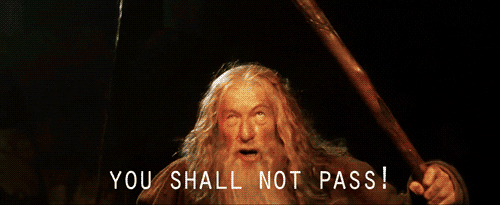
Seriously, though: tropes are just general, undeveloped ideas. That's what you need to do, develop them. In this way only will you ever be able to unleash their hidden potential.
Without further ado, may I present you three of the most common fantasy tropes and hints to reimagine them.
*Keep in mind that this is only my personal view on the subject and you can either agree or disagree with it.
1. The chosen one
This one is the most obvious one and I am also quite sure that you expected to find it on the list. Interesting, Watson: I guess that it makes this article stereotyped too…
Well we all know those characters. Those characters that were meant to be the one. The prophecies had spoken about them long before they were even born. They might as well be the only one capable of using magic or wielding a certain weapon. This character is either the only one who pushes forward the storyline or that one protagonist who does everything except choosing anything actively in the plot. There is no in between. Either way, they only possess notable qualities. Of course there is no trace of flaws. I mean, they are the hero.
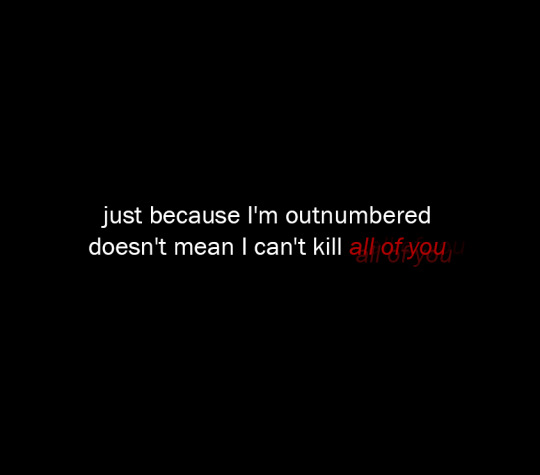
Have a side-kick (or co-protagonist) be the chosen one instead
A great idea, if you really want to insert this trope in your story, is to use it to your advantage and surprise the reader with it. Who could ever expect that the protagonist was actually never the chosen one? Or that another character is the chosen one from the start?
To see this trope well recreated I recommend watching the BBC TV series "Merlin" in which a young sorcerer, Merlin himself, must help the future heir to the throne, the prince Arthur Pendragon, to fulfill his destiny and become the greatest king who has ever lived. Arthur has no clue of what has been foretold, nor that he even is at the centre of a prophecy. All of Merlin and Arthur's choices will determine either the glorious success or the tragic failure of the quest; all of this while Merlin hides his powers from Arthur and everyone else as magic is condemned in Camelot.
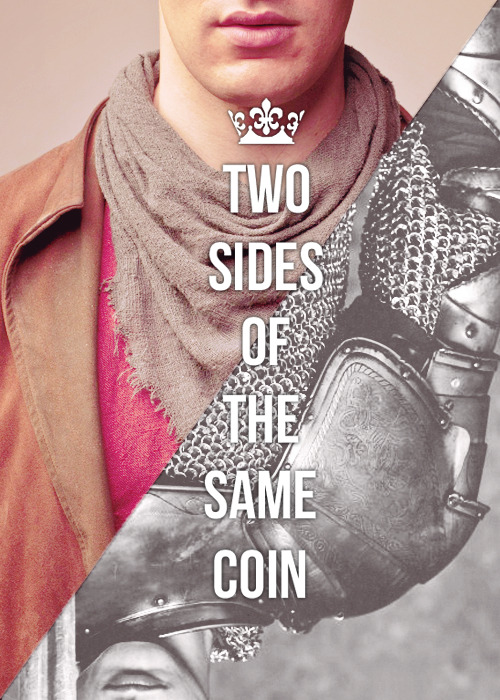
2. Overused fantasy Races
...which translates mostly into putting Elves, Dwarves, Trolls, dragons and any of the Tolkenian elements and creatures in your own story. Now, don't get me wrong. Tolkien is one of my favourite authors, hence I am always captivated by those fantasy novels that display these Races in their stories. But I don't want to read a copy, I want to read your own masterpiece.
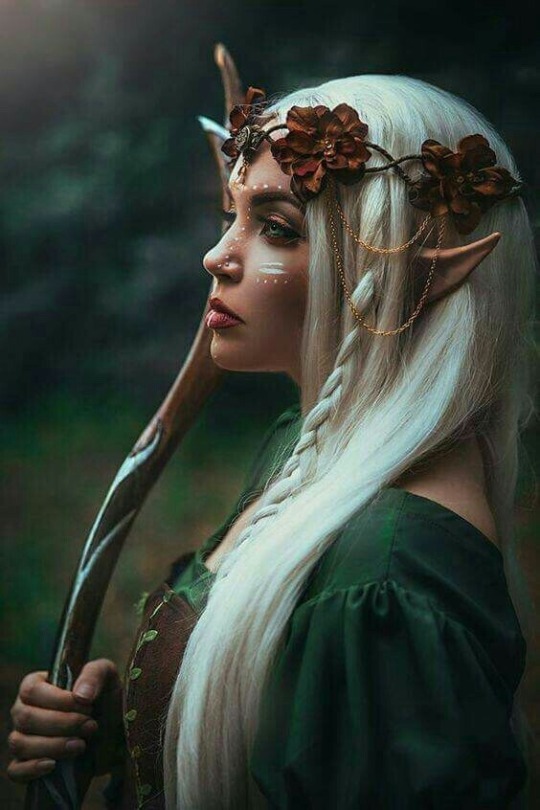
That's exactly why you should:
Redesign the well-known fantasy Races and adapt them to your world and to your theme or just create brand new ones
Personally, I absolutely LOVE to craft new fantasy Races. I believe that it adds depth and realism to the world-building (which does not consist only of geography). Each civilisation brings their culture, their traditions to your story and that's what makes a world truly breathe. In my opinion, the purpose of fantasy is not to focus just on the epic deeds narrated or on endless battles enriched with magic and legends, though those are very important part of this genre and they must be just as equally developed. The reason why I write fantasy is to spread awareness around the vast variety of themes that coexist in our society nowadays, in the first place global warming, the racism that still today people experience, LGBTQ characters which are often unrepresented both in literary fiction and TV. What better genre than fantasy is there to represent diversity and multiculturalism? On these latter points I will never not be thanking and loving the works of Steven Erikson which are part of the high-fantasy series "Malazan Book of the Fallen". Diversity and the brand new variety of intriguing Races are a huge part of what makes Malazan such an awesome fantasy series. I refer to Steven Erikson as the main inspiration of my writing and I recommend you to give a try to his books, if you have the chance. I warn you though, that it is not any light or easy reading.
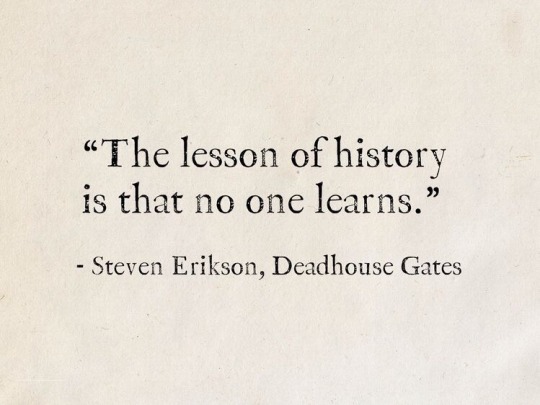
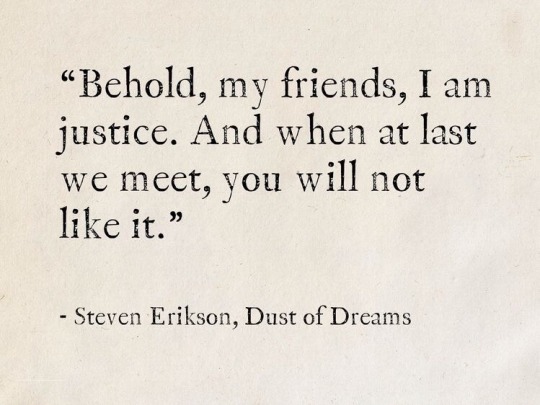
The other option might be to reinvent the well-known Races. Tolkien himself did not "invent" the Elves of Middle Earth, rather he made a legend of his own after having studied the myths and ballads of ancient civilities. Then he developed their language, their history and their culture as if they were a real existing population. Every single aspect of Tolkien's worldbuilding can be read in his Silmarillion. I think it is a must-read for anyone who is looking forward to reinvent the traditional fantasy Races or just to know more about them.
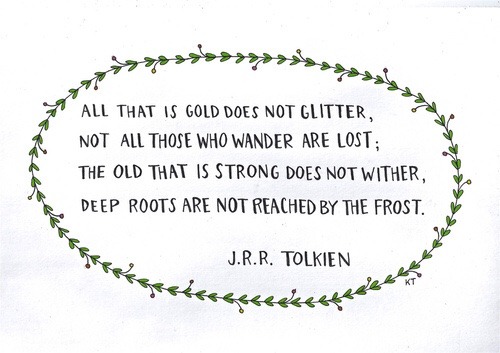
3. Unfailing magic systems
Magic can be anything you want. That doesn't mean, however, that it should be your escape point: stuff in your story should happen because of your characters, not only because of magic as it is simpler to put it that way. A magic system should be rational and engaging. The reader needs to be able to understand exactly how, when and why does magic work in your world. No, the answer should not be "because it's fantasy."
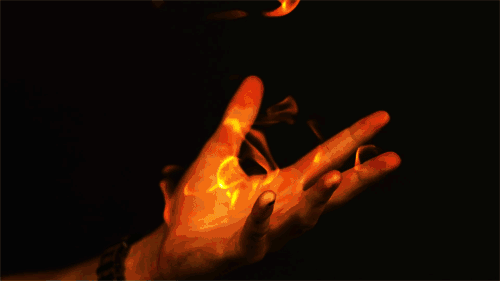
Set rules, limits and costs to the magic in your world
How do character gain magic abilities? Is magic accessible to everyone or is it elitist? Is it taught in specialised schools or is it something that resonates from within? Are wizards free to practice magic or is it banned? Or maybe are there only specific areas of magic that are prohibited? What is its source? Does magic come from higher beings or are spells more powerful the stronger the mage's will? Does magic need a catalyst (such as a talisman, a weapon etc.) to be casted? If not, do wizard recite spells? Do they need to trace specific symbols? Otherwise is it necessary to make specific hand gestures in order to release their powers? Does it exist only one system for all mages to use or are there multiple kinds? Last but not least, what are magic users in your world called? It's all up to you to decide. Ask questions and let each question lead you to another one. You need to know exactly how your magic system works and so does the reader.
What I love about crafting magic systems is the freedom to establish the boundaries and the natural laws that apply to your world, as magic is a huge part of the story if you're writing fantasy. Well, this could also lead to another question: is your world actually ruled by magic forces or do magic abilities have just a marginal role in the world building?
Remember that magic should not be used as an excuse to fill eventual plot holes in your story. Your magic system should function correctly and it should always stay true to itself. In other words, it must be believable.
And I can hear you thinking "but it‘s magic!"
Then guess what? You need to make the readers believe that magic is real!
First of all, set the rules, the limits and the costs that apply to your system. Having done that, you'll have finished most of the work that concerns the use of magic in your world. Most, not all. If you are a bit of a perfectionist like I am, consider the importance of developing your system furthermore by asking yourself questions, such as the one I have written above.
Rules: decide what makes your system work and what magic can be casted for.
Limits: decide what kind of tasks your magic system cannot perform.
Costs: decide from what kind of source is magic obtained from and, literally, what does it cost to mages to obtain their magic from this source (as Rumpelstiltskin of OUAT wisely says: "all magic comes with a price.")
The most excellent and well-rounded magic systems I have ever come across are the ones created by Brandon Sanderson in this "Mistborn" trilogy: allomancy, feruchemy and hemalurgy. All three magic system permit the magicians to use a wide range of abilities based on the metals they can "burn". Magic originates in the Shards and from Preservation and Ruin, two god-like beings. If you're already interested, I definitely recommend you to check Sanderson's novels out: they are a useful resource of inspiration.
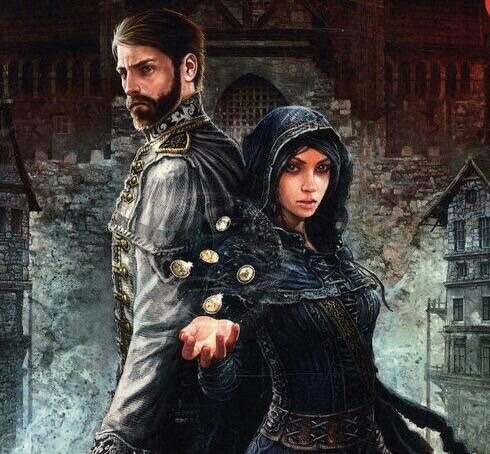
I hope this post has somehow given you the inspiration to go and write right now.
If you have questions about some of the points or requests for the next articles, don't be shy and send me a message! I will try to cover your topic as soon as possible and as best as I can (and I will also tag your profile, if you agree).
Thank you all for your attention. Bisous^^
#books#fantasy#writing#steven erikson#malazan book of the fallen#bbc merlin#mistborn#brandon sanderson#tolkien#silmarillion#fantasy tropes#writing advice#chosen one#magic system#fantasy races
14 notes
·
View notes
Note
I read your opinion on Luthien and I was intrigued about what you considered the selfish side of her. Would you mind elaborate ? I say this because the tale of Beren and Luthien Is the most unispiring tale -at least for me- sacrifying lives for the sake of two lovers
Hello, and thanks for your message and question!
First things first: You, I, we don’t have to feel ecstatic about every characters and every storylines, and you don’t have to justify your preferences. That character doesn’t appeal to you? All right, then! There are plenty of other characters to focus on! (just, you know, don’t shit on people who actually like the characters you’re not fond of). ;)
I do have a very complicated and ambivalent relationship to the story of Beren and Lúthien; I really can’t say I dislike it, not at all, but it tends to upset me. You ask about my mention of the “selfishness” of Lúthien… [To be honest, I don’t really remember what I said in the post you mention (which is probably a rather old one???) so I can only hope that I’ll be coherent and not too repetitive (generally speaking, my opinion hasn’t changed over the years, but it mighthave evolved)] - I can understand that my opinion might seem confusing, but in fact, you answered the question yourself: The sacrifice of many for the sake of one couple… (that’s a schematic presentation, yes). But it’s a bit more complicated than that. I actually like the character of Lúthien per se. I like her as a strong, a bit creepy, dog-eared lady who remains blind to a lot of things. I like her being prideful and I like her being FLAWED. You know why? Because I can relate. I’m not perfect, far from it. Nobody is. And if I cannot see my own flaws in a character, I’ll have a hard time being interested in them.
So my problem with the Lay of Leithian has nothing to do with the characters themselves - whether you like them or not, they remain interesting – it has to do with the treatment of the characters, the (frustrating) perspective adopted by the narrator(s), the way the couple seems to be forgiven deeds which would have been considered criminal/terrible/unforgivable if they had been committed by other characters (follow my gaze).
And yes, I can’t deny that I have my own biased reading because of my preference for the Fëanorians, but I try to be as objective as possible (though I can’t be completely objective. I mean, who could?)
So.
Lúthien is a strong female character, steadfast and fearless, and that’s something I definitely like about her. Now, I’m not fond of the “perfect lady” aura given to the character, you know? This idea that she’s flawless and whatever she does is a good thing. Some sort of a saint (if there were saints in Arda). At no point the narrative voice questions her decisions, she’s always in the light. She is presented as perfect and every other characters seem to agree, no matter what she decides to do. I find all this very irritating, although I guess that’s also what the genre requires (I’ll come back to that point at the end of the post).
Yet, let’s keep in mind that Lúthien is not like the other Eldar; her mother is an Ainu, and that element is extremely important: she is half divine. It’s crucial because it means that
How could the other Eldar and humans not be, at least, fascinated by her?
It must be complicated for the Eldar to actually criticise her… I mean, she’s the offspring of demiurgic power!
She must have a specific fate (if Eru allowed her mom to become incarnate and to have a kid with an Elda, He must have some plans)(spoilers : He does)
She must have a different approach of reality, a different way to feel the world, to live in the world, to be concerned with the world and its inhabitants.
She is powerful and has powers that no other Eldar could ever dream of, which makes her somehow dangerous.
This being said, let’s return the matter at stake: your question about this self-interest of her, and the sacrifices it implies; not the sacrifice of Beren or Lúthien for one another, but the almost death of thousands of Eldar for them to be together (and I won’t talk of here of Finrod’s choices and his gruesome death because that’s a matter which I’ve already talked about at length – here for instance)
Besides, I mostly agree with Litamande’s interpretation of the Nargothrond episode, so I’ll waste no time repeating it and I advise you to read if that’s not already done. I’ll just point out a few selfish elements to actually elaborate on the “selfish side of Lúthien” (although it doesn’t mean I blame her for being selfish):
1. Lúthien would let a kinslaying happen to be with her lover
By disobeying her father and by running to Nargothrond, she took the risk of bringing her father’s wrath to Nargothrond.
I know, I know: the texts say that Thingol gets mad because of the Fëanorians' plan to get her married to Celegorm (mind you, I don’t say the Fëanorians don’t have anything to be blamed for, they do, but that’s not the point of this post) but something tells me that, no matter the nature of the Fëanorians' message, Thingol would have been furious - marriage proposal or not, Thingol could have very well played the diplomatic card, discussed the whole thing (or at least pretended to), got his daughter back and then told the Fëanorians to fuck off. Instead, he prepared his army for an eventual kinslaying. I mean, thanks to the Fëanorians' message, he knows where daughter is, he knows she is relatively “safe” in Nargothrond – and the Fëanorians are just a small impediment which Thingol could get rid of without killing the entire population of Nargothrond…. so I tend to believe that, at this point, Thingol was so offended and upset and panicked in general terms that he would have been mad, not matter who would have said “I found your daughter!”
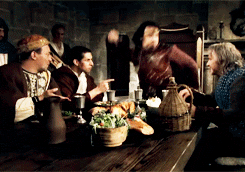
And I do believe that Lúthien knew it, or at least, considered that it could be a possibility. She’s not stupid. She’s definitely not that naïve.
Likewise, after the Tol Sirion episode, she would rather stay with Beren instead of going back to Doriath, even if that decision leads to a war of elves against elves. It is clearly given in the Lay that Thingol was ready to go to war to get her back, and although I can understand why she wants to stay with her boyfriend, the lives of hundreds of elves are at stake! And coming from the heir of a sovereign, it’s rather… unpolitical, to say the least. And yes, selfish. Now, I’m not saying she shouldn’t be selfish! On the contrary. Please girl, do what you will!
What upsets me is that she’s still presented as a flawless saint by the narrator, by the other characters, by the Valar and nobody ever tells her that her decisions almost created a war. How frustrating is that?
2. L&B let a kinslaying happen to keep the Nauglamir in the family
She and Beren have come back from Mandos, they’re in Tol Galen, they have a lovely kid and they talk to no mortal. And they have a Silmaril because Thingol’s dead and Doriath is in a pretty bad state. We know the Fëanorians dare not attack Lúthien, but she knew the risk of keeping a Silmaril, didn’t she? She knew they would do their best to take it back after her death. And although I understand why the Silmaril is symbolically important to her (they died for it , her dad died for it, etc.) she knows what it means to keep a Silmaril; In some versions (“The Nauglafring”, “the Quenta”… see also “The Tale of Years” in HoME XI), Melian herself warns (wrathfully) her and Beren against it… even if Lúthien stops wearing it in some texts, they never ever think about giving it back to the Fëanorians… You’ll tell me that they are the Dispossessed, they can’t have it back anyway, or there would be no story at all.
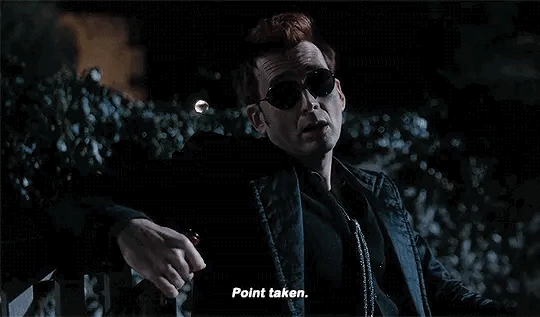
I think what upsets me the most here, is not that she decided to keep it no matter what, but the treatment of it. Again. When anyone else in the texts desires a Silmaril or tries to keep a Silmaril, there’s always a warning somewhere, something implying, “this character is becoming greedy and is making a huge mistake blahblah”. But not here, at no point she’s is given as potentially making a mistake, she’s neither depicted as prideful, nor greedy nor anything – same thing with Beren when he tries to pick up the second Silmaril from the crown of Melkor ; yes he raises hell with his mistake and paid for it, but no one blames him. In the “Quenta” it is even said that he failed to take all the three jewels because of the “knife of the treacherous dwarves”, as if he had nothing to blame himself for… You see why I’m upset. The narrative perspective is completely unfair.
3. The Mandos episode
It is not about Lúthien’s selfishness but it is a fair example of those prejudices. Lúthien is said to be the only one who managed to bring pity into Námo‘s heart. Yet she’s not the only mourning… the Bragollach had happened roughly a decade before the L&B’s story. There are thousands of people in Middle Earth and in Mandos (and in Valinor) weeping and mourning a sibling, a lover, aparent, a child – Lúthien lost her bf whom she met a couple of years before but “her sorrow [is] deeper than their sorrows”??? She is actually given as the one feeling the greatest grief ever? I just… No.
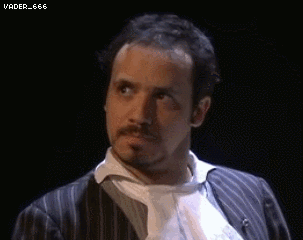
Well, actually, it is no surprise that Námo is moved by her song : she is divine! Her mom sang during the creation of the world…!
Alright yeah, I’m being cynical, I admit it. But what I’m trying to do is not to tell you what’s good or bad or what you should think of the whole thing. I’m barely trying to offer you another perspective, to point at what is not totally clear, what doesn’t make sense to me, what upsets me, so you can maybe see it from another point of view. It’s always an interesting thing to do, even if in the end you don’t change your mind.
And believe it or not, the Lay of Leithian is one of my favourite texts! And maybe it is precisely because of all those elements that confuse me and/or irritate me! At least it gives me something to think about, some new gaps to fill with my imagination!
Now, and this is VERY important, let’s keep in mind that the first Beren and Lúthien writings go back to Tolkien’s youth, and that what Tolkien wanted to do was to write a “heroic-romance from the realm of Faërie" inspired by medieval literature and ancestral folklore. He obviously knew what he was doing, he knew the codes of that kind of literature, and all those elements which I pointed out were carefully wrought by the author; he was aware of the characteristics of the genre and toyed with them, proof is the parodical commentary of the Lay of Leithian by CS Lewis. And come on, technically speaking, the Lay is a masterpiece, if not a feat! Besides, we also know how dear this particular love story was to Tolkien, and without making it a metaphor of his own life, we can’t ignore this aspect. Therefore, my criticisms are neither literary, scholarly ones, nor personal ones against the author. They’re barely the reflections of a very subjective feeling (and I strongly emphasize that word) of my own, regarding those events and the way they are rendered within the whole history of Middle Earth, as in intradiegetic vision of them.
And to conclude, if Lúthien had not fought for her love story to be a thing, therewould have been no Dior, no Elwing, no Earendil… it is a part of the whole narrative line, of the whole scheme that lead to the salvation of the people of Middle Earth in the 1st Age. SO yes, her selfishness is somehow rightful, it has a purpose, it is for the GREATER GOOD. And again, what bothers me is not Lúthien herself, it is the fact that her decisions are never questioned, by no one at any point. And I believe that if some readers don’t find this tale inspiring, as you put it, it is precisely because of the treatment of L&B ; they’re perfect, unworldly perfect, how could we easily relate to them?
#silmarillion#silmarillion meta#silmarillion headcanons#Anonymous#oh wow I hope this isn't too confusing -_-'#ignore the typos pls#headcanon#meta#ooc
103 notes
·
View notes
Text
The Rebuild of Final Fantasy VII: Your Expectations Will (Not) Be Met
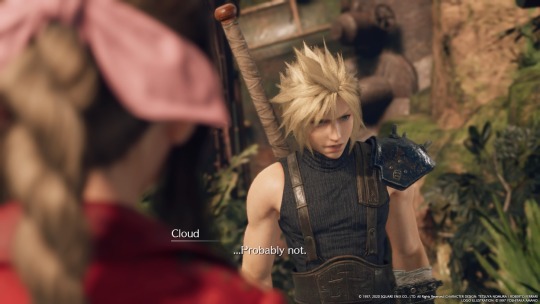
I apologize for the stupid title and I promise I’m going to talk about the Final Fantasy VII Remake, but I have to get this out of the way first. Sometime in the mid 2000s, acclaimed artist and director Hideaki Anno announced that he was going to remake his beloved anime series Neon Genesis Evangelion the way it should have been the first time, free from technical and budgetary restraints. Evangelion had a notoriously strange ending when the original anime aired, consisting of character talking over still images, abstract art, and simple animations. It was highly polarizing and controversial. Anno, for his part, received death threats and the headquarters of the studio that produced the anime was vandalized. Soon after the initial uproar Anno would direct The End of Evangelion, a retelling of the final two episodes of the anime, and that seemed to mostly satisfy the fanbase. Looking back now, The End of Evangelion wasn’t “fixing” something that was “broken,” no, it was a premonition: a vision of things to come. Why remake the ending when you can just remake the whole damn thing?
The mid 2000s also saw the birth of the Compilation of Final Fantasy VII: a sub-series of projects expanding the universe and world of the video game that had “quite possibly the greatest game ever made” proudly printed on the back of its CD case. The Compilation consisted of three games, all on different platforms, and a film. First was Advent Children, a sequel to Final Fantasy VII, where three dudes that look like discarded Sephiroth concept art all have anime fights with our beloved protagonists, culminating in a ridiculous gravity defying sword fight between Cloud and Sephiroth. Before Crisis and Crisis Core are prequels that expand the story of the Turks and Zack Fair, respectively. Then there’s Dirge of Cerberus, an action shooter staring secret party member and former Turk Vincent. Were these projects good? I’d say they were largely forgettable. Crisis Core stood out as the obvious best of the bunch and I think may be worth revisiting.
As a business model, the practice pioneered by the Compilation would continue on and eventually brings us FFXIII (and sequels), FF Versus XIII (which would later become FFXV), and FF Agito XIII (which would later become FF Type-0). If that’s all incredibly confusing to you, I’m sorry, I promise I will begin talking about the Final Fantasy VII Remake soon. Suffice it to say, both Final Fantasy VII and Neon Genesis Evangelion have a certain gravity. They punch above their weight. They are both regarded as absolute classics, flaws and all. And yet, in both cases, the people responsible for their creation decided that their first at bat wasn’t good enough and it was time to recreate them as they were meant to be all along. I think this way of thinking about art is flawed, limitations are as much a part of the creative process as vision and intent. Yet, we find ourselves in a world with a remake of Final Fantasy VII, so I guess we should talk about it.
From this point forward, there’s going to be major spoilers for every Final Fantasy VII related media. So, be warned.
So, is the Final Fantasy VII Remake any good? To me, that’s the least interesting question, but we can get into it. FFVIIR is audacious, that’s for sure. Where Anno condenses and remixes a 26 episode anime series into four feature length films, the FFVIIR team expands an around 5 hour prologue chapter into a 30+ hour entire game. Naturally, there will be some growing pains. The worst example of this is the sewers. The game forces you to slog through an awful sewer level twice, fighting the same boss each time. This expanded sewer level is based on a part of the original game that was only two screens and was never revisited.
Besides the walk from point A to point B, watch a cutscene, fight a boss, repeat that you’d expect from a JRPG, there’s also three chapters where the player can explore and do sidequests. The sidequests are mostly filler, but a select few do accomplish the goal of fleshing out some of the minor characters. You spend way more time with the Avalanche crew, for example. Out of them, only Jesse has something approaching a complete personality or character arc that matters. The main playable cast is practically unchanged which was a bit surprising to me. I figured Square-Enix would tone down Barret’s characterization as Mr. T with a gun for an arm, but they decided, maybe correctly, that Barret is an immutable part of the Final Fantasy VII experience. Also, it’s practically unforgivable that Red XIII was not playable in the remake considering how much time you spend with him. I don’t understand that decision in the slightest.
The game’s general systems and mechanics, materia, combat, weapon upgrades, etc. are all engaging and fun and not much else really needs to be said about it. I found it to be great blend of action/strategy. Materia really was the peak of JPRG creativity in the original FFVII and its recreation here is just as good. The novelty of seeing weird monsters like the Hell House and the “Swordipede” (called the Corvette in the original) make appearances as full on boss fights with mechanics is just weaponized nostalgia. In general, the remake has far more hits than misses, but those misses, like the sewers and some of the tedious sidequests, are big misses. It is a flawed game, but a good one. If I were to pick a favorite part of the game, I’d have to pick updated Train Graveyard section which takes lore from the original game and creates a mini-storyline out of it.
If that was all, however, then honestly writing about Final Fantasy VII Remake wouldn’t be worth my time or yours. The game’s ambition goes way further than just reimagining Midgar as a living, real city. There’s a joke in the JRPG community about the genre that goes something like this: at the start of the game, you kill rats in the sewer and by the end you’re killing God. Well, when all is said and done, the Final Fantasy VII Remake essentially does just that. Narratively, the entire final act of the game is a gigantic mess, but if you know anything about me then you know I’d much rather a work of fiction blast off into orbit and get a little wild than be safe and boring.
In the original games, the Lifestream is a physical substance that contains spirits and memories of every living being. Hence, when a person dies, they “return to the planet”. It flows beneath the surface of the planet like blood flows in a living person’s veins and can gather to heal “wounds” in the planet. In the original game, the antagonist, Sephiroth, seeks to deeply wound the planet with Meteor and then collect all the “spirit energy” the planet musters to heal the wound. The remake builds on this concept by introducing shadowy, hooded beings called Whispers. The Whispers are a physical manifestation of the concept of destiny and they can be found when someone seeks to change their fate, correcting course to the pre-destined outcome. Whispers appear at multiple points throughout the game’s storyline both impeding and aiding the party. The ending focuses heavily on them and the idea that fate and destiny can be changed. We receive visions throughout the game which some will recognize as major story beats and images from the original game. After dealing with Shinra and rescuing Aerith, the game immediately switches over to this battle against destiny and fate that you’re either going to love or hate. The transition is abrupt and jarring. While Cloud has shown flashes of supernatural physical abilities throughout the game, suddenly he has gone full Advent Children mode and is flying around cleaving 15 ton sections of steel in half with his sword. The party previously took on giant mutated monsters, elite soldiers, and horrific science experiments, but now the gloves are off and they’re squaring up against an impossibly huge manifestation of the Planet’s will. Keep in mind, in the narrative of the original FFVII, the Midgar section was rougly 10%, if that, of the game’s full storyline. This is, frankly, insane, but I’d be lying if I didn’t love it.
The Final Fantasy VII Remake, with its goofy JRPG concluding chapter, is forcing the player to participate in the original game’s un-making. We see premonitions of an orb of materia falling to the ground, we see an older Red XIII gallop across the plains, we see a SOLDIER with black hair and Cloud’s Buster Sword make his final stand, we see Cloud waist deep in water holding something or someone. We all know what these images represent, they’ve been part of imaginations for decades. But the Final Fantasy VII Remake allows us (or forces us, depending on perspective, I guess) to kill fate, kill God, and set aside all we thought we knew about how the game would play out post-Midgar. The most obvious effect of our actions is the reveal that Zack survived his final stand against Shinra and instead of leaving Cloud his sword and legacy, helped him get to Midgar safely. I have my doubts and my worries about the future of this series. I’m not sure when the next part of the game will be released or what form it will come in, but I can’t believe I’m as excited as I am to see it.
Of course, part of me wishes they’d just left well enough alone. Remakes are generally complete wastes of time and effort. Not all, but most. Maybe I’m, to borrow a term from pro wrestling lingo, a complete mark here and I just love JRPGs and Final Fantasy VII so much that I’ll countenance close to anything bearing its name. I’ve tried my best to be as critical and fair as possible to the game and I hope that if you’re on the fence and reading this I’ve maybe helped you decide if it’s for you or not. I think the Final Fantasy VII Remake is worth your time if you’re looking for a good, meaty JRPG. It’s not perfect and it’s final act is insane, but that just makes me love it more.
Have you ever wondered what it would be like for Zack, Cloud, and Aerith to face Sephiroth in the Planet’s core? I know 15 year old me did. And he may get his wish.
6 notes
·
View notes
Text
Hello world... again
Hellooo,
Thank you for finding me! \(^o^)/
This blog is mostly to promote my favorite arts & music, plus some stuffs about audio production (technical or not).
I used to have another blog on the same topics under the same name. However, due to some issues with Tumblr support (nothing illegal I swear o.O), I now need to create another one.
What you’ll find here:
Reviews of mostly non-mainstream musicians and their works (albums, singles, soundtracks, lives, operas etc.)
My journey of sound exploration, including discussion of music genres, recording techniques, instrument design etc.
(Sometimes) Other stuffs: books, art films, anime, paintings, comics, manga, sculptors, 3D rendering etc.
MINIMAL shitposting. I may post #random things and #announcement from time to time.
The truly irrelevant stuffs are marked with #please ignore. Just block them.
I aim to churn out contents once every week for short posts (starting Aug this year), but more in-depth stuffs may take months, as I’m rather busy irl.
Now, here are some house rules before I start with the juicy posts:
1. Non-mainstream music?
That’s over-generalizing a bit, but I like weird stuffs from different genres all over the world. If it’s done right to me, it doesn’t matter if it’s jazz, pop, house, avant-garde, classical, hip-hop, soundtrack stuffs or whatever in-between.
A few examples (not in any order): Kajiura Yuki, Ennio Morricone, Billie Eilish, Sergei Rachmaninoff, Björk, Agust D, Ulrich Drechsler, Hanoi Duo.
With that said, I’m quite biased with a mix of powerful female vocals, stuffs in minor keys & lots of evolving counter melodies. Sure, each of those do typically appear in mainstream music, but I tend to prefer more eclectic combinations of them. I’m sure I’ll unconsciously cover more people like that.
You’ll likely discover lots of weird people here. Do follow official channels of those who interest you! :D
2. Sound exploration...?
Well, after having too much time for introspection during Covid-19, I’m thinking of switching career to something along the line of foley artist or sound engineer. No idea what I want yet, so I’m exploring possible professions. Since this is a music-related blog, I just want to share my journey, haha.
Posts about this will have a separate hashtag so those not interested can ignore them. Topics will range from modding instruments, sound-making & recording paraphernalia, music theory, music history etc.
3. Weeb? NO. Maybe nerd at most.
In case someone spotted me mentioning “anime” and “manga” and thought “what if...”, no, I’m not into waifus, bishounen cults, or the other stuffs (you know what I mean)... Do not expect such contents here, though you can freely fangirl/fanboy about your favorite stuffs in the comment section (but keep it toxic-free plz) (^o^)/
I love many anime & manga series just as much as I enjoy Pan’s Labyrinth or NatGeo documentaries. I casually join fandoms, but I’m not hardcore and by no means an expert in anything. So do correct me if I get some facts wrong!
4. NO political stuffs, conspiracy theories, fan wars etc.
More like, I’ll keep potentially toxic stuffs to the minimum. I’ll still discuss them objectively if they’re relevant to the topic at hand.
E.g. how a group’s disbandment may affect a musician’s solo career etc.
With all the crap happening in the world, we could do with a bit more positivity. And cooler heads. So I will NOT rant extensively about such things. And I WILL report such posts if I ever see them here.
I don’t care if you shitpost elsewhere. I do too. But please just spare this place...
Also, yes, it’s important to be aware of certain social issues.
However, I believe such things should be discussed with well-sourced information, clear illustrations and non-malicious intents. Not angry people throwing their opinions on the table, and sometimes throwing the table themselves. And more importantly, MUCH MORE IMPORTANTLY, social issues must be solved by consistently educating oneself and taking actions OFFLINE.
If you still wanna do that here, please please please switch to DM. I do want to have discussions with you.
Finally, I naturally stand at a respectful distance to my fav musicians.
I do get hyped and have expectations ahead of releases. But I’m not the type to directly message my favorite musicians, or queue up for hours to get their autographs. I also don’t collect merchandise or limited-edition items. I don’t go on “pilgrimages”.
Just listening to their music, promoting them and supporting them financially (through streaming, buying releases, attending lives) is good enough for me.
I don’t encourage this kind of behavior actually. Without avid fans, lots of musicians would starve... But this is just how I am.
Plus, there’re just too many musicians I like. If I were too hardcore, I wouldn’t have time & resources to support them all xD
I’m interested in what they can share about their personal lives, but I don’t want to dig deeply into things that may disturb them. Unless they did something unlawful (not just morally questionable) that went unnoticed or unresolved (like smoking weed where it’s banned and not getting caught).
I love to discuss what make them spark as well as their flaws, casually but objectively. But I’m only human so biases is unavoidable.
I always want to anticipate their next works or breakthroughs, if any, as long as their interest in making decent music is still there.
Liking their music doesn’t mean I need to like them as people. And certainly not love them romantically.
I sometimes need to compare some aspects of them (e.g. musical inspiration, background, how they’ve changed following financial success or failure etc.) But I’ll avoid that as much as possible, especially when it comes to music groups. A group is more than just its members.
All questions & gossip regarding opinions of fanbases should go to my inbox, and not anonymously (cuz I can’t reply you otherwise).
I wanna keep this space clean, so I want to avoid fan wars & jumping to conclusions.
Pretty sure it will happen eventually anyway, one way or another...
Wew, that sure is a lot of text *sweats*. Hope I’ve made it clear to you and myself what this blog will be like.
Please anticipate my next post around 2 months from now.
Thanks for reading. m(_ _)m
#music#review#hello world#why am I posting this when my next post's supposed to be 2 months from now
3 notes
·
View notes
Text
On Banana Fish’s Ending
Welcome to the hell that is Banana Fish’s ending. If you like it it’s hell. If you hate it it’s definitely hell. If you’re like me somewhere in the middle but closer to “I don’t like this” it’s hell. We’re all suffering.
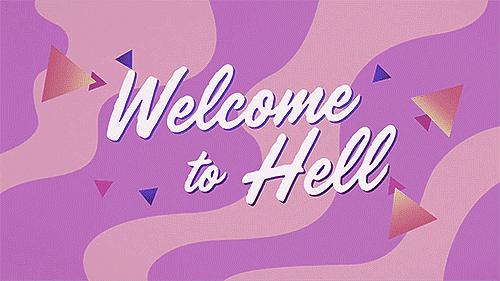
Like any useless writer, I cope by writing out my feelings so here, have this.
I can see why some feel the ending narratively works in some respects, and in some ways I can even agree it can be read in certain ways that make it work. But I also think a happy ending could have been just as narratively excellent, depending on the execution, and my personal opinion is that this would have been a more responsible ending. But no one has to agree, and I understand why people hate the ending and why people defend the ending.
I’m going to talk about this in a few segments: authorial statements, social messages, and genre. (I’m writing another meta on the narrative themes of the ending because that section got massively long.) For what it’s worth, a story does not exist in a vacuum, and while it’s absolutely valid to interpret and critique a story according to simply the written story, it’s also valid to weigh authorial intent (or to dismiss it), and to evaluate how the story plays into both larger cultural messages and larger literary trends. Any author 100% knows that their story will be interpreted according to all of these. But what follows is mostly my opinion/explaining why I feel as I do. It is not me saying anyone has to feel or interpret it the same way.
Authorial Statements
I know Yoshida has made... contradictory and, frankly, offensive statements on the ending, in which she’s said things such as that Ash narratively had to die because he was a murderer and people who kill need to pay with their own lives. In general, Yoshida seems to struggle in interviews--like saying she hates Yut-Lung when the story’s moral center character (Sing) literally tells him in his last scene “I can’t hate you” and promises to help him redeem himself. This is hardly unique to her. It’s hard to explain a complex element of story in a few sentences of an answer. Ishida’s first interview after the end of TG had some cringeworthy moments, Rowling seems to make constant missteps (and retcons), etc. Hence, I generally employ “death of the author”--I think the author’s intent matters to the extent their work conveys their intent, but not if their work contradicts what they then say.
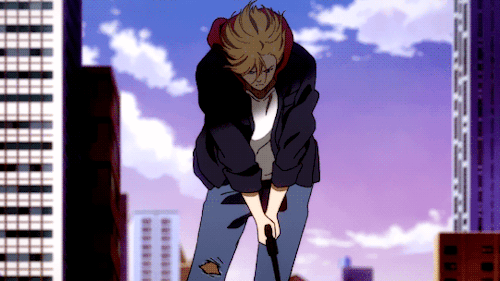
The entirety of Banana Fish contradicts this idea of murderous karma. In fact, the story is at its core about finding a way out of a violent cycle, of finding freedom. Ash dying with a smile on his face literally says that he did not die trapped in a system of karmic violence with no hope of freedom.
Not to mention Sing is a murderer. Yut-Lung* is a murderer. Blanca is a murderer. They all live, and get hopeful (even happy-ish) endings and implied redemption for Yut-Lung and for Blanca.
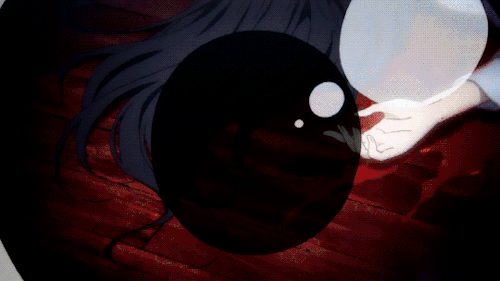
*I know Yut-Lung is name-dropped as having been assassinated in a later manga called Yasha but like, he never actually appears in Yasha and it has nothing to do with his character’s arc in Banana Fish, so I don’t think it’s relevant to anything relating to Yut-Lung’s character as we know him. It’s really just an Easter egg, and since Yut-Lung dying in Yasha is a retcon of the fact that his arc ending with him living in the main story (Banana Fish) I feel completely free to disregard it as not actually canon.*
Additionally, Banana Fish takes empathetic looks at children who are suffering in a world where they are forced into the roles of prostitutes and killers, and what’s the point of empathy if it can’t change anything? Eiji is noted to basically be walking empathy, having a gift for comforting those around him, and the mutual, spiritual, and yes, romantic, love he and Ash share changes things for Ash (and for Eiji). To say that death had to happen narratively is to say that Eiji was, in the words of his critics, useless, which is rather at odds with the central emotional draw of the story: Ash and Eiji’s relationship. It contradicts Eiji’s beautiful letter, the one that Ash smiled as he died because of, because in this letter Eiji assures Ash: “you can change your destiny.”
So anyways, regardless of what Yoshida says, Ash being a murderer is not a narrative justification for the ending because that simply isn’t what the story conveys.
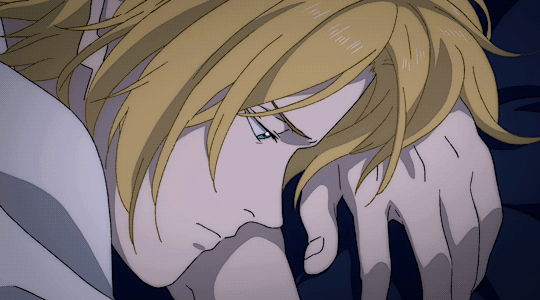
That being said, that perspective--that Ash’s death is karma for killing--is exactly Ash’s perspective. Just when he was about to overcome his flaw of not seeing his value by realizing how much he meant to Eiji, Lao reminds him of Shorter’s death, the one thing he cannot forgive himself for. And so Ash allows himself to die. But the thing is this perspective is wrong and narratively condemned. Eiji’s letter offers a counter to this, but Ash doesn’t take it (which is slightly inexplicable). Plus, as we see in “Garden of Light,” it leaves Eiji unable to completely overcome his flaw (an inability to act/truly live) for seven years, so the story condemns it too.
And, of course, Ash also did not kill Shorter out of malice--he was forced into it, like he was forced into the life he had to live with Dino. It’s not the deaths of one of the people begging to be spared whom Ash killed for playing a role in killing Shorter, but Shorter’s death itself that brings about fear and mistrust in Lao. To have Ash’s death be a consequence for killing willingly (which he did plenty of), it should have been for one of those nameless people we got a brief shot of, instead of as a consequence for a murder Ash had no choice in and was a victim of almost as much as Shorter was. But that also wouldn’t work because a nameless death doesn’t quite suffice for offing your main character, so. Yeah. Ash’s death is not a narrative consequence for killing others; it’s expressly framed as a tragic and cruel result of his inability to forgive himself for specific acts that were not his fault.
Social Messages Part 1: LGBT relationships
While Banana Fish was written in the 1980s-90s (kind of a dire time for LGBT+ people in the United States with the AIDS crisis), the trope of “bury your gays” has received rightful criticism since, and the ending can definitely be seen as “bury your gays.” (A criticism that is not helped by what happens to the gay/bi character in Yasha.) In other words, while I think the themes, characters, and frankly issues of Banana Fish are generally timeless, the ending is the only part of the story that I don’t think ages well. As time goes by, it will probably get even more criticism because of current society finally moving towards being better in the portrayal of LGBT+ characters.
*Because I want to complain and explain why I really don’t consider anything post-GoL canon: the follow-up picture book “New York Sense” doesn’t help the “bury your gays” impression either: Sing and Akira are certainly intended to be parallels to Ash and Eiji as Akira is brought to the US by Ibe and interacts with gangster Sing in “Garden of Light,” and while such framing is very ambiguous/bordering on not being there in GoL the follow-ups absolutely paint a romantic framing to their interactions in GoL. They marry and raise a son, popping up in cameos in Yoshida’s other works. Hence it runs dangerously close to reading as the heterosexual couple introduced in the epilogue got the happy ending while the gay couple we spent 19 volumes with did not. Since Sing is also still heavily involved with the mafia in all of the follow-ups, this again contradicts narrative justifications for Ash’s death as karma.
While I very much like Akira’s character, her romance with Sing isn’t just uncomfortable because of the above issue--it’s also uncomfortable because she is 13 and he is 23 in GoL (though their relationship doesn’t have to be read as mutually romantic there, and I don’t read it that way) and according to “New York Sense,” they marry when she is 18 which... implies things that seems very, very out of character for Sing, the series’ moral compass, and dramatically contradicts the skeevy adults preying on kids theme. It can also raise some cringe-worthy questions about why it’s framed as okay for the heterosexual couple but negatively (as it should be) for the people--who are primarily men--who assault Ash (and there is noted to have been a woman who assaulted him in “Private Opinion”). Like with Yut-Lung’s death, I just... don’t accept this retconning as canon. It contradicts the themes of Banana Fish as a story so I don’t have to.*
Social Messages Part 2: Abuse Survivors
For people who have been through abuse similar to Ash’s, in which choices over basic things like life, death, and your own body are taken from you, it’s honestly cruel to show someone who has spent their entire life suffering just about to grasp happiness, and then they die. It is fully valid to find this completely distasteful, and I do too.
But for me at least, one aspect that circumvents... some of the distasteful implication that Ash really was broken by things he had no choice in is the fact that Ash triumphed over his abusers first. Yet of course, having him die afterwards still hurts people who read the story and see themselves in a character like Ash, as it can reinforce the idea that abuse defines your life.
I do wish (though I don’t think there’s a moral necessity) that more authors/creators would acknowledge that, in creating characters whom you in theory want people to relate to, see themselves in, root for, care about, you’re asking people to suffer with them as they suffer and if they die, grieve for them. Given the heaviness of Ash’s arc and the specific nature of his suffering (especially since it was horrifically emphasized in the story’s last arc with Foxx), the fact that Ash didn’t in the end overcome the message that he did not have value is going to be very painful for readers/viewers. (Lao missed his vital organs, so Ash really chose to die instead of getting help, because he chose to believe Blanca over Eiji, which... I’m not sure it quite works.) If you could have narratively had it end happily (and it absolutely could have, and apparently Yoshida’s editor told her not to end it with Ash’s death), there’s room to say that going with the tragic ending is hurtful and bordering on irresponsible.
Genre
That defeat of Ash’s abusers is the reason I don’t think Banana Fish is quite as tragic as other stories like, say, the first Tokyo Ghoul or Hamlet or Macbeth, though it’s certainly tragic. In those stories, every single characters’ flaws lead to them dying, and it offers a cautionary tale. Banana Fish is more in the vein of say, Romeo and Juliet, or even the movie Titanic (I’m not making a romance comparison, for the record), in that the main characters might die, but their choices and the people they loved and how they loved manage to save a city, in the case of Romeo & Juliet, or to save Rose in the case of Titanic. In Banana Fish, Ash did help Eiji live, even if Eiji would need time to process it after the set-back of Ash’s death.
In other words, even if I’m unhappy with it and I am, I don’t consider Banana Fish’s ending nihilistic. It wasn’t “life sucks and then you die,” at least not to me. Life sucked, but it also meant something, even beyond Ash’s relationship with Eiji. Ash’s life had value. Through saving Sing in the story’s climactic battle, and then helping Max with that article that would save other child prostitutes, Ash saved younger versions of himself. That’s powerful. Not only that, but Ash found love and hope in his personal life as well with Eiji, Max, Shorter, etc., and through that genuine happiness. Even if he couldn’t fully grasp it, he knew it was there, and he died knowing there was genuine, true love, and therefore beauty, in the world too. And that, for me, comes across as far more hopeful than surface-level, cheaper happier endings. But still, the fact that Ash couldn’t fully experience this beauty and happiness because of the cycle of violence he had no choice about being involved in, plus a questionable character decision, does leaves a bitter taste in my mouth. (That questionable character decision, with the letter not having a full effect, makes tragedy seem a bit forced on Yoshida’s part.)
I want to quote Arthur Miller’s “Tragedy and the Common Man,” and I’ve highlighted parts I think explain how I feel about Banana Fish and Ash’s character (in particular, why I don’t think a tragic ending necessarily sends a nihilistic message, at least not to me):
The Greeks could probe the very heavenly origin of their ways and return to confirm the rightness of laws. And Job could face God in anger, demanding his right and end in submission. But for a moment everything is in suspension, nothing is accepted, and in this sketching and tearing apart of the cosmos, in the very action of so doing, the character gains "size," the tragic stature which is spuriously attached to the royal or the high born in our minds. The commonest of men may take on that stature to the extent of his willingness to throw all he has into the contest, the battle to secure his rightful place in the world.
There is a misconception of tragedy with which I have been struck in review after review, and in many conversations with writers and readers alike. It is the idea that tragedy is of necessity allied to pessimism. Even the dictionary says nothing more about the word than that it means a story with a sad or unhappy ending. This impression is so firmly fixed that I almost hesitate to claim that in truth tragedy implies more optimism in its author than does comedy, and that its final result ought to be the reinforcement of the onlooker's brightest opinions of the human animal.
For, if it is true to say that in essence the tragic hero is intent upon claiming his whole due as a personality, and if this struggle must be total and without reservation, then it automatically demonstrates the indestructible will of man to achieve his humanity.
The possibility of victory must be there in tragedy. Where pathos rules, where pathos is finally derived, a character has fought a battle he could not possibly have won. The pathetic is achieved when the protagonist is, by virtue of his witlessness, his insensitivity, or the very air he gives off, incapable of grappling with a much superior force.
Pathos truly is the mode for the pessimist. But tragedy requires a nicer balance between what is possible and what is impossible. And it is curious, although edifying, that the plays we revere, century after century, are the tragedies. In them, and in them alone, lies the belief-optimistic, if you will, in the perfectibility of man.
This applies to basically all tragedy, of course, but I think some tragedies are more hopeful than others. And I see that struggle in Ash’s, and a hope in Banana Fish that I don’t see in other more nihilistic stories. Ash fought to reclaim the humanity that people tried to deny him, and through Eiji realized his humanity was there all along.
Anyways, these are my complicated, all-over-the-place feelings on the ending. It’s fine for people to feel strongly either way, but also understand that when discussing such a heavy, fundamentally triggering work, it’s good to be sensitive to where people are coming from and interact with differing opinions with empathy. Many of us relate to characters like Ash, Eiji, and Yut-Lung, and since you don’t know where someone is coming from, let them express their feelings, and be kind.
I’ll post another meta on thematic impressions on Banana Fish later. But to each their own. Also please note, again, this is really just my opinion.
#ash lynx#banana fish#banana fish ep 24#eiji okumura#asheiji#yut-lung lee#yue lung lee#sing soo ling#shorter wong#lao yeon-tai#lao yen-thai#banana fish meta#banana fish ending#ramblings#akimi yoshida
627 notes
·
View notes